













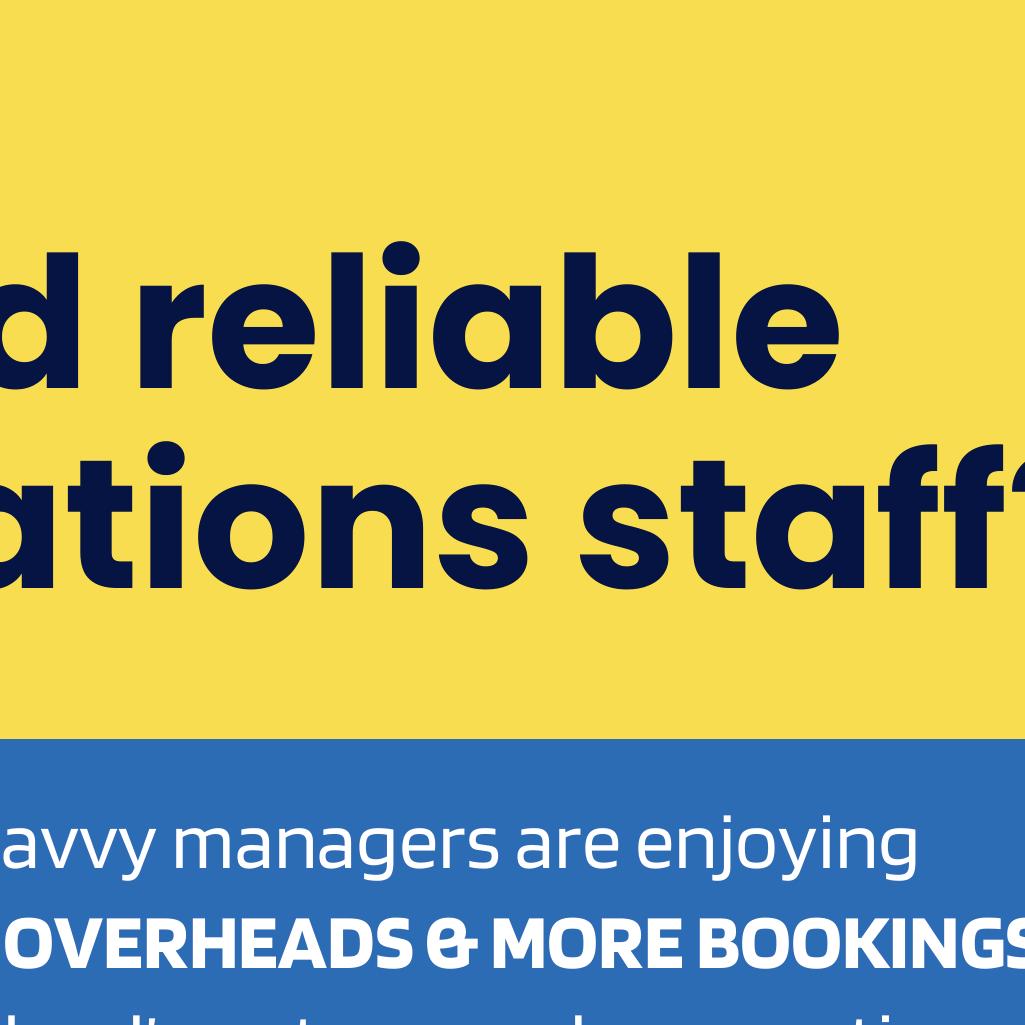










Our intuitive software uses advanced technology for simplified trust accounting. Backed by our dedicated support team.
The ultimate solution for streamlined management rights and holiday letting.




























































Our intuitive software uses advanced technology for simplified trust accounting. Backed by our dedicated support team.
The ultimate solution for streamlined management rights and holiday letting.










































The views and images expressed in Resort News do not necessarily refl ect the views of the publisher. The information contained in Resort News is intended to act as a guide only, the publisher, authors and editors expressly disclaim all liability for the results of action taken or not taken on the basis of information contained herein. We recommend professional advice is sought before making important business decisions.
The publisher reserves the right to refuse to publish or to republish without any explanation for such action. The publisher, it’s employees and agents will endeavour to place and reproduce advertisements as requested but takes no responsibility for omission, delay, error in transmission, production defi ciency, alteration of misplacement. The advertiser must notify the publisher of any errors as soon as they appear, otherwise the publisher accepts no responsibility for republishing such advertisements. If advertising copy does not arrive by the copy deadline the publisher reserves the right to repeat existing material.
Any mention of a product, service or supplier in editorial is not indicative of any endorsement by the author, editor or publisher. Although the publisher, editor and authors do all they can to ensure accuracy in all editorial content, readers are advised to fact check for themselves, any opinion or statement made by a reporter, editor, columnist, contributor, interviewee, supplier or any other entity involved before making judgements or decisions based on the materials contained herein.
Resort News, its publisher, editor and sta , is not responsible for and does not accept liability for any damages, defamation or other consequences (including but not limited to revenue and/or profi t loss) claimed to have occurred as the result of anything contained within this publication, to the extent permi ed by law.










Advertisers and Advertising Agents warrant to the publisher that any advertising material placed is in no way an infringement of any copyright or other right and does not breach confi dence, is not defamatory, libellous or unlawful, does not slander title, does not contain anything obscene or indecent and does not infringe the Consumer Guarantees Act or other laws, regulations or statutes. Moreover, advertisers or advertising agents agree to indemnify the publisher and its’ agents against any claims, demands, proceedings, damages, costs including legal costs or other costs or expenses properly incurred, penalties, judgements, occasioned to the publisher in consequence of any breach of the above warranties.
© 2024 Multimedia Pty Ltd. It is an infringement of copyright to reproduce in any way all or part of this publication without the wri en consent of the publisher.
Commercially
Supplier information or content
Suppliers share their views in one-o topical pieces
General editorial. Case studies and features may cite or quote suppliers, please be aware that we have a strict ‘no commercial content’
Last month was a whirlwind, with back-to-back deadlines for two Resort News issues and a particularly huge edition of our quarterly magazine AccomNews on the go. Amid the chaos, I had one of those “I can’t do this” moments. Then, a ray of sunshine appeared on my social media feed in the form of 23-year-old Noosa local Alexa Leary. You might have seen Alexa’s interview on TV with a sports channel presenter after securing her spot in the 2024 Paralympics in Paris. Watching the interview, which has deservedly gone viral, I was captivated by her pure, unabridged excitement, gratitude, and positivity. Alexa’s journey back to health and her unwavering self-belief, driven by a childhood vow to become an Olympian, is truly inspiring.




Mandy Clarke, Editor editor@accomnews.com.au
Her honest charm and beaming smile quickly put my “poor me” antics in check. The whole Leary family is off to Paris to support Alexa, and I’ll be following her incredible journey closely. We catch up with the Leary family on page 31.



Also in this issue, on page 6, I delve into the impact of new regulations, like those from Brisbane City Council, on the STRA industry. I’ve posed some important questions to industry leaders about the future of the ever-growing STRA market and its role in management rights and the broader housing ecosystem.
Don’t miss this month’s fantastic interview on page 14 with Manchester muso Alex BarkerRé. Alex and his Australian wife, Eloise, changed their lives forever when they discovered management rights 25 years ago and moved from the UK back to Queensland. From Majestic Palms, their stunning apartment complex at Yorkeys Knob, where they’ve been since 2011, Alex shares his ongoing passion for the industry and North Queensland after managing eight properties over 23 years.
This month’s profile on page 40 features the “Godfather of Management Rights,” Keith Braithwaite. I popped around the corner from my apartment in Newstead (side-stepping my building’s pesky Airbnb guests!) to Unison Apartments for a chat with him. You will enjoy reading about his journey from wool buyer to becoming one of the most respected MLR managers, proficient in the industry for well over two decades, and let me tell you, he shares some valuable advice.
Finally, I am looking forward to the ARAMA Top Awards 2024 on July 23 at Sea World Resort, Gold Coast. Our Resort News and AccomProperties team will be there. Make sure to come and say hello and share a yarn or two! Warm regards, Mandy











By Mandy Clarke, Editor
The growing trend of properties being used for independent Airbnb style short term rental accommodation (STRA) instead of long term housing is seen by many as a significant factor in the rental crisis. The lack of regulation around this is another major concern.
Some argue that reliance on STRA exacerbates housing affordability issues for locals, pushes up rents, and reduces the availability of long term rental properties. Experts have suggested various measures to address it, such as implementing a Canadian style vacancy tax, tightening rules on using residential properties for tourism, and introducing licensing fees and levies.
STRA’s impact on tourism and the housing crisis
Michael Crosby, Head of Public Policy for Airbnb in Australia and New Zealand, emphasised the positive economic impact of Airbnb. “Forty percent of Aussie Airbnb hosts rely on the income from hosting to make ends meet,” Mr Crosby said. He argues that any new permit system should not restrict residents’ ability to earn income from their primary assets. He states: “Short term rentals play a vital role in providing flexible accommodation options, especially during major events like the Brisbane Festival and the upcoming 2032 Olympics.”
In the opinion of Accommodation Australia’s (AA) outgoing CEO Michael
Johnson, although there is a place for STRA in the tourism accommodation sector, it is currently “unfettered and under regulated.” He praised recent moves towards control across all states and territories noting that the Federal Government has requested ministers to look at STRA regulations. He points out the example of Western Australia, which now has a state wide registration process, a 90 day cap, and a financial incentive to revert to long term rental. However, he says, “enforcement will be the key,” and short stay platforms like “Airbnb must also take responsibility”.
Importantly he states: “The last thing we want to see is a levy on all accommodation” because hotels, motels and resorts “do not contribute to the removal of housing stock from the long term rental market”.
Trevor Rawnsley, CEO of the Australian Resident Accommodation Managers Association (ARAMA), believes that governments should provide more incentives for investors to switch to long term rentals. He said: “The current crisis is driven by a combination of overseas owned online travel agencies like Airbnb taking homes out of the long term rental market and harsh rental tenancy laws.”
However, in a bold move, Brisbane City Council recently announced new regulations requiring landlords to secure council approved permits before listing their properties on short term rental platforms like Airbnb. This decision, unveiled by Brisbane Lord Mayor Adrian Schrinner has ignited heated debate across the industry, highlighting the complex
interplay between housing availability, the thriving STRA market and accommodation industry professionals.
Starting soon, landlords in Brisbane will need appropriate planning approvals, body corporate support, and a 24/7 property manager to obtain a permit for STRA. Properties that fail to meet these requirements must revert to long term rentals. This initiative aims to prevent properties from being used as “mini hotels,”. The hope is that it will increase the availability of long term rental housing in a city grappling with surging property prices and a rental vacancy rate of just 0.9 percent.
But Airbnb’s Mr Crosby questions the effectiveness of the new regulations in significantly increasing long term rental availability. He pointed out that Airbnb properties make up less than one percent of Brisbane’s available housing stock.
Onsite manager Marion Simon, who owns the management rights of Boulevard North, highlights the disparity when owner occupiers decide to list their own units on Airbnb. She says that although management rights owners are expected to belong to several industry groups, be licensed, and carry out professional career development, owner occupiers do not have to bear any of those costs. This discrepancy often leads to guests expecting the same services as those who rent apartments from the letting pool.
She said: “Independent Airbnb guests do not understand that equipment onsite managers have purchased is not for their use. We are expected to manage parties and bad behaviour, yet our liability insurance does not allow us to be involved. Lockouts and lost keys are another headache; we can have independent Airbnb guests knock on our door at all hours, expecting to be assisted.
“Furthermore, owners and guests within the holiday letting pool do not understand the difference between independent Airbnb apartments and those within the letting pool. This can lead to considerable time and resources being used on marketing the holiday apartments when one badly behaved guest erases all our hard work and investment. And if a letting pool guest behaves badly, we can take immediate action to evict the guest, but we can’t if the apartment is outside the letting pool.”
She believes the “council’s recommendation for STRA to be overseen by an onsite manager, 24 hours a day, seven days a week, will assist with the above challenges”.
Mr Rawnsley also supports the principle of registration through licensing. He points out that management rights businesses are already ideally placed due to MLR regulations and letting agreements but he says the requirement of needing body corporate support for planning approvals is “scary” because it “gives one lot owner power over another. I find it extremely offensive,” he said.
In contrast, Laura Bos, General Manager of Strata Community
Association Queensland (SCAQ), supports allowing body corporate committees to make their own decisions on short stay accommodations. She said: “Ultimately, state legislation has not kept up with the disruption caused by the evolution of the STRA sector, and it’s something they need to look at and fi x immediately. It’s about finding a way to manage short stay accommodation appropriately, balancing the needs of property owners and their neighbours.”
A requirement for body corporate consent is a major policy shift that will set the stage for batt les within bodies corporate, warns Chris Irons, former Queensland’s Commissioner for Body Corporate and Community Management. He said: “The Council is advocating for changes to Queensland strata legislation to allow a body corporate to prohibit, or strongly regulate, short term lett ing in a building. These are significant developments because as it stands, a body corporate cannot prohibit short term lett ing.”
“It is a position confirmed in several legal cases over the years, stemming from adjudications (and appeals) based on section 180 of the Body Corporate and Community Management Act 1997, and in particular, subsection (3): ‘If a lot may lawfully be used for residential purposes, the by laws cannot restrict the type of residential use.’”
If the state government agrees to the council’s changes, he says you will have owners who let out their property on a platform like Airbnb, facing the prospect of that business ceasing unless they can convince other owners or a strata committee otherwise. Then you will have some owners and some committees who are ideologically opposed to Airbnb and the like, who would never approve a permit in a million years, just on principle. He added: “While giving bodies corporate the right to decide what works for them is a positive step, it has to come with fair and reasonable guidelines. Based on what council is saying so far, it seems tipped too far in one direction.”
Frank Higginson, Partner at Hynes Legal, confirmed that currently, bodies corporate cannot interfere with people’s right to use their lot for residential purposes, be that short stay or long stay. QCAT has held that short stay occupation is not the commercial use of a lot but a residential one.
He thinks a change of law would be “incredibly dangerous given the emotions that come with people using their lots for purposes not in accordance with the desire of others in their body corporate”. He says that applies both ways–short stay in long stay buildings and long stay in supposed short stay buildings.
He said: “Planning and regulation of the use of lots should stay with the relevant local authority who have the infrastructure and necessary legal authority to deal with alleged breaches of the town plan. That same local authority also has the ability to change the town plan as needed to regulate use far more eff ectively than an individual body corporate might.”
Mr Rawnsley too, is very concerned about over regulation. He points out that bodies corporate are usually dominated by owner occupiers and warns that giving them the power to control other unit owners/investors by restricting or banning short term lett ing in strata is “un-Australian.”
“What about giving people a fair go? This is not ‘The Castle’. It’s the thin edge of the wedge, what’s next? Banning singing in the shower or whistling on a Tuesday? For harmonious community living in schemes, it is the behaviour of the occupants that is important. Good communication between the body corporate, onsite manager and unit owners is vital. Giving one party more power than another is a dangerous path to take and where will it end?”
Instead, he says the solution is for governments to “use a carrot and not the stick” and provide investors with incentives to switch their housing investment portfolio to long term rentals. Importantly he emphasises that ARAMA members may
use OTA platforms including Airbnb to market their holiday apartments, but this is very diff erent to listing traditional suburban family homes.
He said: “Unit blocks must have STRA as part of the mix because tourism is also important, and most units that have holiday lett ing are in tourist areas. High rise apartments are perfect for short term lett ing and long term lett ing and can segue between the two depending on market demand.”
Chris de Closey, Director of Switch Hotel Solutions, also wholeheartedly agrees that giving veto powers to bodies corporate will only “create a scenario where these volunteers wield too much power, ultimately resulting in exploitation.”
He said: “A body corporate should not have the power to tell anyone what they can do with their investment.”
He strongly supports local regulation to ensure that property managers are contactable 24/7. “I have seen customers left stranded due
to a poor property manager,” he said. “Implementing greater controls and legislation around property management will help weed out bad eggs and help create a better experience for both guests and owners of the apartments.”
Australian & New Zealand Short Term Rental Association (ASTRA) CEO Mitchell Price also opposes giving bodies corporate the power to make decisions that aff ect property owners. He added: “This strips away the rights of ‘mum and dad’ owners to occupy or rent for short, medium or long term.”
STRA regulations like those being introduced by Brisbane City Council raise important questions about the future of the STRA market and its role in the broader housing ecosystem. As Brisbane moves forward with its new regulations, the eff ectiveness of these measures will likely depend on careful implementation and ongoing dialogue between policymakers, industry stakeholders, and the community.

























By Trevor Rawnsley, CEO, ARAMA
The recent industry survey highlighted the major concerns for resident managers and gave our association the vital information we need to address those issues.
The survey was conducted in April and May 2024 with more than 300 responses. They identified three major worries:
• The diminishing size of letting pools.
• Bullying and harassment.
• Changing legislation.
The survey gathered deep insights into the needs, challenges, and aspirations
of ARAMA’s current and potential members. Building strong relationships is the key to addressing these issues.
Let’s look at the issues and see how ARAMA can help
Before the recent housing crisis, a manager might lose a unit to an owner-occupier every now and then. Letting pools naturally increase or decrease over time, and the tide is running out at the moment.
The business model for the MLR industry has changed significantly in the last few years, just like every other business, and it is no longer just a case of sitting back and taking a commission from letting out units.
When an investor is being offered two or three times what they paid for a property, many owners are simply opting to take the money, and they generally don’t care who they sell to. They will take the highest bidder.
The average scheme has 50 lots. The resident manager can still function well with a few losses to owner-occupiers. But if you only have a small letting pool and a couple of units go from under you, it can be a real
problem for cash flow and impact the value of the business.
Some schemes still have very stable letting pools, but the recent trend of owner-occupiers moving into what were once investment units is symptomatic of the current housing crisis. The economy is being squeezed, interest rates are through the roof, and people are desperate for a place to live. There is a chronic lack of supply, and more owner-occupiers are buying lots in community title schemes that investors had previously assigned to resident managers.
Still, there are many ways to overcome this drying up of letting pools. By having a good relationship with owners and investors in a scheme, resident managers dramatically increase the chances of keeping a unit in the letting pool.
The very successful resident managers are also involved in the sales process and are attuned to everything that is happening in their scheme.
They build good relationships so that when an owner decides to sell, they come to the resident manager to find a buyer. The manager can then do their best to find another investor who will keep the property in the letting
pool. The successful operators who are unconcerned about shrinking letting pools have been proactive about building relationships. They get involved in sales training and constantly preach to the owners about the benefits of onsite letting. They are the ones who have a long list of investors in their database. They may also have investors within the scheme keen to buy another unit in the same scheme. If they have a strong relationship with the owners, they will know when an owner wants to sell. They can go to their investors and offer them an off-market deal and become involved in the negotiations between seller and buyer, all the while doing their best to ensure the lot stays in the letting pool by advocating the benefits of onsite management.
The commission from the sale is an added bonus and should be treated as such, with the real aim of keeping the unit in the letting pool.
Successful managers become the sales agent for their owners and market the properties to their own clients.
Even if a new owner decides to live in the property and it leaves the letting pool, chances are
that in 12 months they’ll decide to rent out the property again. If the resident manager has been proactive and built a good relationship, that property will go back into the letting pool.
ARAMA encourages our members to seek out organisations that offer training to sell units within a scheme.
Sadly, some managers ignore these services. They don’t want to pay for training and want someone else to do the selling. Then when the unit disappears from their letting pool, they complain about the situation, saying it’s unfair that owners want to move into their own unit.
Some people are simply toxic, and they exist everywhere in a world that is increasingly hostile. People in all service industries speak about increased anger and rudeness these days. Problems are magnified further in strata schemes when you have neighbours in close proximity, living beside and on top of each other.
Some owners simply don’t like management rights because of ignorance they don’t understand the benefits of management rights issues over money. They resent having to pay for a resident manager despite the proven benefits and they feel their power is diminished because a manager reduces their ability to boss everyone around in a complex.
Power and money are powerful motivators that can create toxicity. But it works both ways. If a resident manager has the relationship skills of a bull in a china shop, there’s a good chance they will eventually complain about being bullied or harassed too.
Resident managers usually don’t experience bullying in the traditional sense, but they may face rudeness and friction. How they handle that is crucial. Our whole industry was bullied and harassed over the last couple of years with threats to cut terms, but we stayed the course by emphasising the positive aspects of management rights. If you are a good manager, doing the right thing, and building good relationships with owners and residents, you will

realise that you don’t have to win every argument, and the instances of friction in your scheme will be a lot lower.
At ARAMA, we spend a lot of time creating strategies to counter the rise of toxicity in society with initiatives such as our Relationship Revival Master Class (ARRM).
We are working with the Queensland Government and other key stakeholders to create “Psychologically Safe Communities” to address the instances of bullying and harassment in the strata title industry.
We have a webinar on bullying and harassment in strata on our website, and members also have our member assistance program A-MAP – a free crisis counselling hotline – if they feel that they simply cannot cope with the stress of dealing with neighbourhood disputes.
Through A-MAP, our members can talk to a qualified psychologist or crisis counsellor, who will give them the tools and advice to deal with whatever problems they face in these stressful times.
ARAMA exists to represent the industry in a way that our members can’t. Members can’t get a meeting with the attorneygeneral, and members don’t get invited to write policy, but ARAMA does this and more on behalf of its members.
Advocacy is what ARAMA does. We started as an advocacy group more than three decades ago when proposed changes
to Queensland law would have shot down the Management and Letting Rights industry just as it was starting to take off.
ARAMA has been the insurance policy for the MLR industry, even in the recent debate over cutting 25-year terms. There has been a lot of reform in the last few years, and we have spent a lot of time working on new laws to safeguard MLR businesses. For a while, it seemed almost
impossible to convince the state government to secure long-term agreements, but we did. We didn’t win every argument over the new residential tenancy laws, but we had some great outcomes. To promote the benefits of MLR, when it comes to forming policy, resident managers must do the best job possible so that they are also advocates for the industry. By doing that in their scheme, managers can have a positive effect on social and economic impacts, making their business stronger and community more harmonious.
It was extremely gratifying to find from our survey that overall satisfaction among ARAMA members is high at nearly 90 percent. This positive feedback underscores the value ARAMA provides to industry members as we continue to meet your evolving needs.
Our commitment to advocacy, professional development, and member support remains essential. Together we can navigate the future successfully, ensuring great results for all stakeholders in the MLR industry.












By Ben Ashworth, Senior Associate, Small Myers Hughes Lawyers
Caretaking and building manager agreements generally require the caretaker to conduct regular maintenance and upkeep of the common property.
This usually encompasses a requirement to perform small jobs that don’t require a special skill or trade, like touching up damaged paint or replacing the occasional plant. What can be difficult to define in many agreements is the line between a small maintenance job and a task that is over and above the scope of the caretaker’s duties.
•
•
•
•
•
•
•
•
•
•
•
Ideally, the duties in an agreement clearly define the difference between maintenance that must be performed by the caretaker and work that is “extra”. Unfortunately, this is not the case in many agreements, especially older ones. Where the wording of an agreement is vague or uncertain, it can result in disputes with the committee, like when it comes time to paint an entire fence, replant a garden bed, install a new door—the list goes on… How to tackle these issues can be tricky when they are unique to each building, and there is very little to go on in the agreement to guide you. If you find yourself in this situation, the specific facts of your circumstances will be crucial to coming to an understanding with the committee. However, in most situations, the following principles can help you and your committee come to a reasonable and fair outcome when deciding what is or isn’t included in your standard caretaking duties.
How often is the task needed? If the task is not needed every year, it is a strong sign that the task is something out of the ordinary and not something within the scope of a typical caretaking agreement. If the task is needed at least once a year, is it needed because it is something that is required as a matter of routine, or is it needed simply in reaction to events that tend to occur more than once a year (like storms or vandalism)? Tasks that are sporadic and reactionary in nature, are less
likely to be considered within the scope of typical caretaking duties.
If the task to be performed is included in the 10-year forecast plan for the building, like painting or replacement of facilities, it is very likely not within the scope of typical caretaking duties.
If the task requires materials or equipment provided by the committee/owners that is paid for from the sinking fund, it is very likely to be a capital works task and not within the scope of typical caretaking duties.
If the task takes more than a few hours to perform but isn’t specifically identified in the agreement, it is usually a sign that the task isn’t within the scope of the caretaker’s regular duties. When the caretaking agreement already lists several tasks that take several hours to perform, it is notable when a task that will clearly take several hours to complete isn’t specifically identified as a duty in the agreement.
Whenever you are unsure about whether a task you have been asked to perform by the committee is within the scope of the duties you are required to perform, you should endeavour to have an open discussion about it with the committee. Maintaining regular and productive communication with the committee is essential to a strong management rights business. If speaking with the committee is unsuccessful, you may want to consider seeking legal advice from a specialist who deals with caretaking agreements every day.
Liability limited by a scheme approved under Professional Standards Legislation.
Disclaimer – This article is provided for information purposes only and should not be regarded as legal advice.



































































































A recent ABC news story highlighted alleged kickbacks and commissions strata management companies in New South Wales may be collecting.
The story may have been an eye-opener for many Queensland bodies corporate or lot owners, as the thought of body corporate management companies in Queensland, receiving commissions and benefits may evoke unease and doubt amongst owners.
Not that it’s necessarily illegal, either…
Body corporate legislation varies from state to state and this article seeks to provide clarity and ensure readers are well-informed about the disclosure requirements of body corporate management companies under Queensland body corporate legislation.
In Queensland, the Body Corporate and Community Management Act 1997 (the Act) covers the receipt of commissions and benefits by body corporate managers and caretaking service contractors.
Under the Act, where commissions and benefits are provided, it requires disclosure to the body corporate to ensure that there are no potential conflicts of interest or breaches.
Schedule 2 of the Act includes a code of conduct for body corporate managers and caretaking service contractors.
One of the main concerns of body corporate management companies receiving kickbacks and commissions is that they

may not be working in the best interest of their body corporate. It opens up the possibility of them making subjective recommendations of goods and services not being supplied at competitive rates based on what they benefit themselves.
This can lead to a body corporate engaging a service or a provider that may not be the most suitable or costeffective, but what’s best for the receiver of the commission, be it financially or as a gift.
The Queensland Government recognised these issues and introduced strict disclosure requirements for commissions and benefits received within the Body Corporate and Community Management regulation updates in 2020.
The purpose of these disclosure updates was to emphasise the necessity for body corporate managers and caretaking service contractors to disclose any commissions, payments, or benefits associated with contracts being considered by a body corporate, including insurance policies.
Notably, the biggest update was adding to existing disclosure requirements that any monetary benefits had to be disclosed to ensure transparency. Disclosure requirements were expanded to include insurance policies held by the body corporate and mandated the inclusion of all details of any parties involved and any benefits they could receive.
The updates also included provisions to restrict committee members from receiving benefits from a service contractor or caretaker unless authorised by the body corporate, to remove the potential for preferential consideration of a specific contractor.
We now look at the Queensland body corporate legislation and the disclosure requirements of commissions or benefits received.
When a body corporate is considering entering a contract for the supply of goods or services, it should request written confirmation from the body corporate manager or caretaker of any association with the provider of the contract. Even if the body
corporate does not specifically ask for written confirmation, under the legislation, the body corporate manager or caretaker is required to disclose, in writing, any associations.
This notice will identify the contract and the nature of their relationship with the provider and any commissions, payments or other benefits they may receive due to the association. The most common example would be when a body corporate committee is approving the insurance policy that was arranged by a body corporate manager.
Often body corporate managers have a relationship with an insurance broking firm, sometimes multiple firms. A relationship could range from part-ownership of the brokering firm, receiving a commission—via the broker—from the insurer or a share of the broker fee.
In all these scenarios, the body corporate manager must provide a written notice to the body corporate outlining the association with the broker, and the exact monetary amount they will receive if the insurance policy offer is accepted.
The general meeting disclosure requirements relate to the insurance policy the body corporate is confirming or considering.
The notice of your annual general meeting, or a note attached to the administrative fund budget proposed, must include all details related to the insurance policy.
The details must disclose if there is any type of monetary or other benefit that will be obtained and if the insurer, insurance broker or intermediary will provide any type of monetary or other benefit, to any of the following parties:
• the body corporate;
• a member of the body corporate;
• a member of the committee for the body corporate;
• a person engaged as a body corporate manager or service contractor; or
• an associate of a body corporate manager or service contractor.
It is important to ensure these details are correct. Adjudicators have upheld that failing to disclose correct information relating to commissions is a failure of legislative obligations and leaves motions open to dispute. This ensures transparency within the body corporate, but also falls in line with one of the secondary objectives of the Act, which is to provide an appropriate level of consumer protection for owners.
Committee members are not bound by the same disclosure requirements as a body corporate manager or caretaker. They can only accept a benefit from a caretaker or service contractor if they have been authorised by the body corporate at a general meeting by ordinary resolution.
If the body corporate manager, or caretaker, fails to disclose a commission or benefit, or that they are an associate to a provider or contract that is being considered, the body corporate can take action in the Magistrates Court which may result in fines. Failing to act in the best interests of the body corporate, conflicts of interests and failing to ensure competitive prices for goods and services, are reasons a body
corporate manager or service contractor may be in breach of their code of conduct.
Separate from pursuing a fine being applied, if a body corporate manager or caretaker for a scheme fails to perform their duties, and comply with the Act or code of conduct, the body corporate can choose to issue a remedial action notice.
This notice, which must contain specific details contained within the regulation module, may allow the body corporate to terminate its agreement with its body corporate manager or caretaker if an issue goes unresolved.
A remedial action notice allows the body corporate manager or caretaker to resolve the issue. It isn’t a one-way ticket for the body corporate to end a contract they don’t favour.
While it may not seem that a remedial action notice would be difficult to prepare, a body corporate should consider obtaining legal advice before serving it. It is important to highlight that while the disclosure changes made to the legislation aim to help mitigate potential issues that can arise regarding commissions and benefits, a body corporate can directly obtain their quotes for policies and works.
Bodies corporate that work directly with companies, may receive benefits.
Keep in mind that a body corporate manager is engaged to help a body corporate. They are not decision-makers and can only act on the instructions of a body corporate or committee.
Turning our attention to realworld examples, commissions come in many forms, be it a financial payment or another type of benefit.
It is not beyond the realms of possibility for a body corporate manager or caretaker to receive an all-expenses paid holiday from contractors, brokers or insurance companies for access to a large portfolio of bodies corporate as new potential clients. Examples of commissions of this type, including cash payments, may be harder to discover. Cash payments could be made by businesses or maintenance

Commissions come in many forms, be it a financial payment or another type of benefit
contractors (painters, plumbers, electricians) to a body corporate management firm or caretaker to be on a list of preferred tradespeople. Under this arrangement, they are the first call for quotes/service from a body corporate manager or caretaker.
A payment received by the body corporate manager to recommend specific contractors must be disclosed, regardless of the timing of the payment— even if it’s a yearly subscription that the service contractor pays the company—or in cash. If the body corporate manager obtains goods and services that are not competitively priced, they may be in breach of the code of conduct.
To clarify, body corporate managers can have preferred tradespersons, but yet not receive payment from such contractors. It is only if they receive a benefit that they are required to disclose the practice.
Whether benefits are an allexpenses paid day out at the races or even a box of doughnuts or cupcakes for the office, any benefit received by body corporate managers and caretaking service contractors must be disclosed to the body corporate.
If you or your body corporate have concerns relating to commissions or disclosure requirements, you should discuss these arrangements with your body corporate manager or caretaker or seek legal advice on the matter.
Remember that our information service is here to answer your questions. Call us at 1800 060 119 or submit your question through our online inquiry form.
This article is general information only and not a substitute for legal advice. For more details on bodies corporate in Queensland, visit our website.


By Grantlee Kieza, Industry Reporter
The constant drizzle of Manchester, England, was a steady backdrop as Alex Ré honed his skills as a drummer and keyboard player for his electro-pop dance band in the late 1990s. Alex started his own record label and managed and played in a band called “Swish”, performing gigs across England’s northwest. The band had “a great songwriter” and Alex recalls having “an awesome time” despite the fickle weather. Back then, he never dreamed he would one day run apartment complexes in tropical North Queensland and bask in a successful career in management rights!
Then Alex met his future Australian wife, Eloise Barker, and his life – and the weather – changed dramatically.
“It’s amazing where life takes you,” Alex said. “And management rights has taken me to paradise. I loved working in the music industry, but we didn’t quite make it to where we wanted, so we ended up disbanding. I’m not really involved in music now but one of our two sons is studying for a Bachelor of Music in Brisbane. Music was a fun career, but I never really made a living from it, management rights has been a much more rewarding endeavour in so many ways.
“When Eloise and I married, we combined our surnames into Barker-Ré. My original surname is Italian in origin; my dad is Italian, and my mum is half Spanish, half English. Eloise’s parents had management rights

in Mooloolaba and sent us information on how the industry worked. I thought, ‘Wow, that sounds like a great industry to get into’. That was 25 years ago, and we haven’t looked back.”
Eloise and Alex moved to Australia and went into business with her parents, Rosemary and Keith Barker.
“We bought our first management rights at Robina on the Gold Coast,” Alex said. “It was an off-the-plan, big permanent letting complex. We had to wait three months for stages to be developed and then we went into the property to run it in 2001. There were 64 apartments spread out over about 2ha. That was our first venture into management rights, and we ran that complex from scratch.
“But we always had a sort of longing for North Queensland. We’d been to Port Douglas on holidays and knew we’d like to live and work there. Port Douglas is the place that drew us to North Queensland, and we fell in love with it. Port Douglas is somewhere I’d like to retire to, but not just yet.”
The family sold on the Gold Coast after a year and a half and then started up in Port Douglas with a medium-sized permanentletting business with 26 villas.
“Again, it was another offthe-plan complex, so at the time, we were specialising in permanent rental buildings off the plan,” Alex said.
For the next few years, Alex and Eloise had four or five management rights businesses, bought and sold on the northern
beaches of Cairns. At the same time, from 2003 to 2004, Alex began representing Ross Venz Management Rights Specialists, as their North Queensland sales director and was responsible for selling tens of millions of dollars’ worth of management rights and associated property.
“We then ran a big holiday resort for a developer at Trinity Beach, between Cairns and Port Douglas,” he said. “That was 100 units, so a big property. At the same time, we bought into a couple of permanent letting properties, and along the way, I was also selling management rights for Ross Venz. Management rights is a wonderful business, and I’m so glad that we found it and have been able to help other people become involved, too.”
In 2011 Alex and Eloise bought the management rights for Majestic Palms, a stunning contemporary apartment complex at Yorkeys Knob, a coastal suburb of Cairns.
“We’ve had the management rights here for 13 years,” Alex said. “It has 52 apartments, and it’s been a great business for us.”
Majestic Palms is also in a spectacular location, just 15 minutes from the Cairns city centre, just under an hour from Port Douglas, and only 10 minutes from the turn-off to the scenic drive to Kuranda and the beautiful Atherton Tablelands beyond. Yorkeys Knob is hidden away behind a headland that juts out into the Coral Sea, and many repeat visitors say it is one of Tropical North Queensland’s best-kept secrets. It has a laid-back tropical atmosphere and a feeling of seclusion, making it the perfect destination for holidaymakers looking to relax and unwind.
The sweeping deck of the local Yorkeys Knob Boat Club provides spectacular views of the yachts moored in Half Moon

Bay and out to the headland of Trinity Beach. And the Half Moon Bay Golf Club is right beside the boat club. Majestic Palms is just a two-minute walk to the beach, marina, and shops, and close to Cairns International Airport, James Cook University, and all the reef and rainforest attractions.
Alex said: “Obviously Queensland’s weather was one of the reasons I fell in love with the industry.
“When you compare tropical North Queensland with Manchester, where I was living when I heard about management rights, you can certainly see the attraction and why Eloise and I moved to Australia. But there were other factors, of course. I loved the outdoor work when we started (not so much now) and the lifestyle is just brilliant, especially in the permanent management rights space because we found that as long as we were doing a great job for the body corporate, the owners, and residents, we could manage our own time.
“We immediately realised that the business of management rights was a fantastic investment with 25-year terms, and the Cairns and Port Douglas areas
We’ve now had eight management rights businesses over 23 years
having such a strong focus on the industry. We’ve now had eight management rights businesses over 23 years since we started on the Gold Coast, and we are so glad that we made the move and invested in this sector. We’re still going strong and live and breathe the business.”
Alex described himself and Eloise as “the ideal advertising couple of management rights because we love it so much and it’s been so good to us”.
For the last five years, Alex has also been selling businesses for Cairns-based Calvin Bailey Management Rights. Calvin told us: “As a resident of our great area for over 17 years, Alex strongly believes in this beautiful region, its resilience, and its added value for the resort and tourism operator.”
Alex tells clients: “What you are buying is not just a home and a business but a lifestyle
that is second to none. Add to this, a purchase in this fantastic destination that gives you so much more resort for your dollar. Everyone loves the extraordinary ‘bang for buck’ we repeatedly deliver here.”
Alex said that despite repeated threats over term from unit owners’ associations, he was confident management rights would remain “a marvellous investment and lifestyle business” for diligent operators.
“Negativity makes the biggest noise, and unit owners’ associations have been making a lot of noise for 30 years or more, and they haven’t got very far with their anti-management rights attacks,” he said. Alex stressed it had been proven time and time again that resident managers were the most cost-effective management model for unit complexes and did a better job than outside sources.
“As long as managers are doing a good job and have a good relationship with their bodies corporate – and that’s the vast majority of managers – the negative people won’t get a look in,” he said. But Alex also has important advice for anyone wanting to follow his family into the industry.
“I see a lot of buyers jumping into management rights for the first time,” he said, “and sometimes they get into the wrong one. Not that it’s a bad building or anything, but they just haven’t done their research. Management rights properties come in all shapes and sizes –holiday complexes, permanent complexes, corporates. I always advise people to make us agents do our work. Don’t get railroaded into the first property you see. I advise people to look at four other properties and compare them with the one they’re looking to buy.”
Finally, but most importantly he says, “surround yourself with good management rights people. You need to consult specialist agents, accountants, and lawyers who are experienced in management rights, and not ones who just profess to be. You won’t go far wrong if you take all those steps”.





By


The rapid evolution of digital technology has made privacy a hot social topic, and nowhere more so than in strata communities.
With records being digitised, communications taking place mostly online, and security cameras beaming images over the internet, the question of how all this data is being managed and who has access to it can create confusion and conflict.
Resident managers occupy a unique position in this debate. They can inhabit three personas directly affected by questions of privacy: caretaker, lot owner, and letting agent. They may also control or manage the means by which people’s privacy can be recorded: the CCTV cameras.
The question of how privacy issues are handled depends on
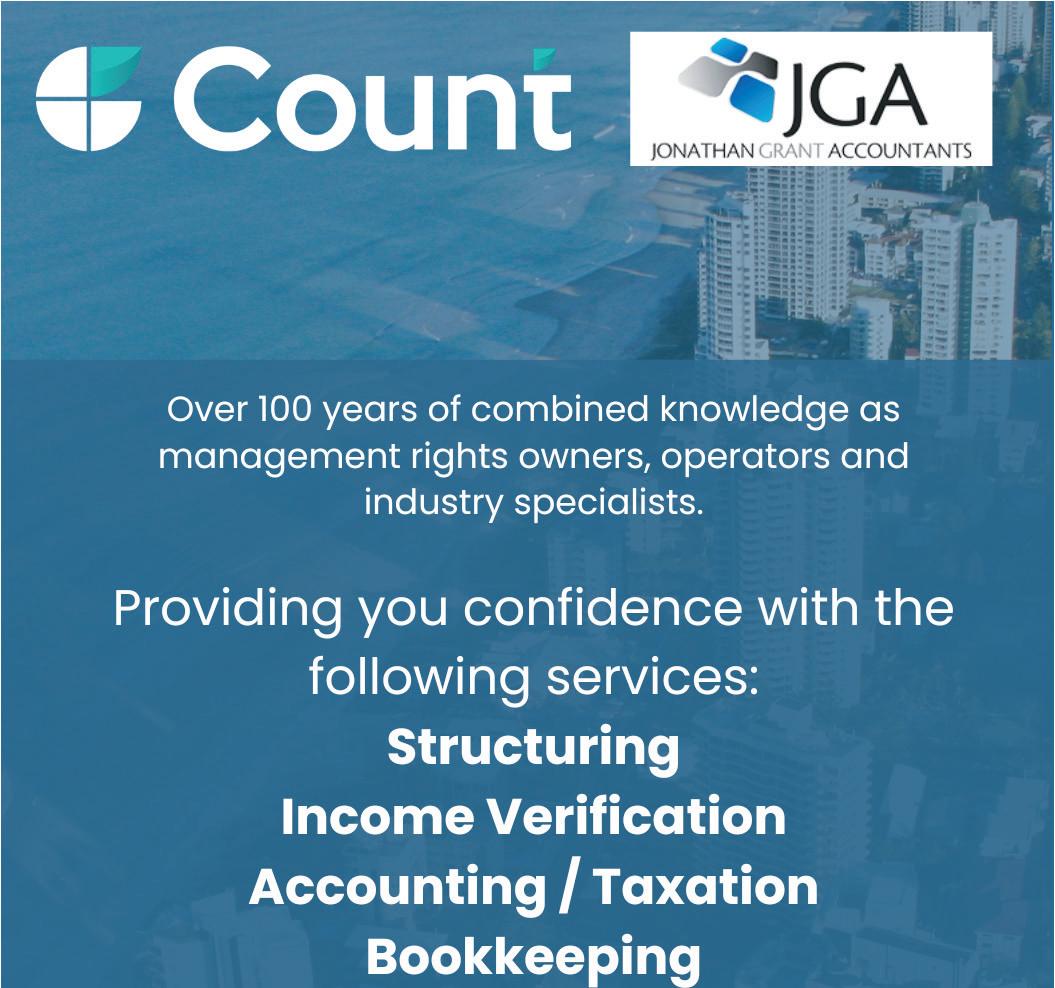

which hat the resident manager is wearing – and to some degree, who is asking the question.
From a caretaker’s perspective, any relevant matter or correspondence that comes to a resident manager should be passed on to the body corporate to be part of the body corporate’s record. It is well established that CCTV footage is part of this.
If a resident makes a complaint about people swimming in the pool outside of operating hours, that information should be passed on to the body corporate to form part of the record and for the committee to act upon.
As a lot owner, a resident manager has the same rights and responsibilities as all other members of the body corporate. They have just as much right to quiet enjoyment of their property as any other owner.
However, with their letting agent’s hat on, a resident manager faces a different set of responsibilities when it comes to privacy.
The letting agent has a fiduciary agreement with the owners they represent through the letting pool. This is the same type of relationship that lawyers have with their clients, where you must put the interests of your clients first.
A question from another lot owner or the body corporate committee about the identity or contact details of a particular owner or tenant should be met with a polite but firm, “I can’t help you.”
That information is part of a private relationship between the resident manager as letting agent and the owner of the relevant lot.
Up until now, most body corporates have not been subject to the Commonwealth Privacy Act, as their annual turnover is usually below the benchmark
level of $3 million. However, as outlined by my colleague Anitah Kumar from Redchip Lawyers, the federal government is considering removing that exemption, meaning many strata businesses could become subject to laws about safeguarding consumer information and requiring comprehensive privacy policies.
From a body corporate perspective, there really is no such thing as private information. All emails, correspondence, and contact details of lot owners form part of the body corporate record. By law, an interested party cannot be denied access to those records. There are very rare exceptions to this, primarily relating to defamation and advice that is legally privileged.
An adjudicator’s order in the Queensland Body Corporate and Community Management Commission made in May 2024 shows the law comes down decidedly in favour of the interested party’s right to access body corporate records.
In a case involving Winchcombe Place in Brisbane, the body corporate had refused a lot owner’s application for a copy of the body corporate roll.
The adjudicator found the body corporate had not complied with its responsibilities under the legislation, noting: “Regardless of its opinions on the ‘community benefit’ of records being disclosed, the committee has no authority to withhold records from lot owners.”
A resident manager facing a request for information should direct the inquiry through to the body corporate manager.
And if they feel they are being unfairly pressured to release any information, it’s always wise to seek legal advice.




















By Jonathan Hanaghan, Director, Jonathan Grant Accountants
Every year from July 1, all Australian resident taxpayers need to provide the deputy commissioner of taxation with a compliant tax return declaring all amounts of assessable income and the associated expenses they have incurred in earning this income.
For some, this is quite a simple aff air, but for most trading within the accommodation industry, it can be more complicated.
More often than not, an entity tax return (that is, trust, company, or partnership) must be completed as well as at least one individual tax return.
I will now go through a stepped approach that should be useful in collating the required information and ensuring you meet your taxation reporting obligations.

Due date for lodgement
Find out from your accountant or tax agent what your due date for lodgement is. This due date will range from October 31 to mid-May the following year. For most businesses lodging with an accountant, their due date will be mid-May.
Obtain a checklist or information request
Contact your accountant for this. It may be a standard checklist or a more customised and detailed list of the information required.
Discuss how, when, and where your work will be processed. Your accountant should have a standard processing timeframe. Agreeing on the time frame for completion is even more important if you require your tax returns for a finance application, an annual bank review, or are part of a corporate agent partnership. Generally speaking, if you need your finance approval pre- December-31, you can use the prior year’s tax returns.
Ensure your bookkeeping soft ware program is accurately reconciled to June 30
Whether you use MYOB, QuickBooks, Xero, or another program, you need to ensure that your data is accurately reconciled to June 30 of the relevant

financial year. This is important as it provides the starting point for your accountant to begin processing your work. Those who have their books kept internally by their accountant’s in-house bookkeeping services don’t need to worry about this step.
Collate supporting information as per your checklist or information request
This may require gett ing copies of bank and loan statements, purchase and sale contracts for assets bought and sold (including property, shares, motor vehicles, etc.). You may need to contact your bank, solicitor, stockbroker, or real estate agent. This can take time, so it is best to get onto this as soon as possible.
Make sure all ATO payments have been made and are up to date
Ensure that any outstanding amounts of income tax, GST, or PAYG have been paid. If this is not the case, you will need to advise your accountant.
Forward all information to your accountant
This involves sending all requested information to your accountant together with any other written instructions, including details of who is best to deal with any queries that may arise. At this point, you may also be required to sign an engagement letter or similar document outlining both parties’


roles and responsibilities. If you are unsure about any matter, contact your accountant before sending. It is better not to start an engagement until all relevant information is with your accountant.
Step eight:
Dealing with queries
Make yourself available via phone or email to deal with any queries from your accountant. Most taxation compliance jobs have transactions that require clarification. It is best to deal with them as quickly as possible.
Step nine:
Debrief
This can involve a meeting or a phone call to discuss the resultant financial statements and tax returns. It is important that each client understands the contents of the tax returns, as each taxpayer is ultimately responsible for the contents of their own tax return. This is also a good opportunity to discuss any other issues or questions you may have, such as changing soft ware programs or even selling the business.
In summary, the taxation system in Australia is based on selfassessment, so each taxpayer needs to take care when preparing their tax returns. This all starts with the quality of the information supplied to your accountant and the planning that goes into the process. A smooth engagement with minimal or no queries will always result in a much better outcome for both client and accountant.

By Andrew Morgan, Motel Broker/Partner, Qld Tourism & Hospitality Brokers
2024’s mid-year market update feels like Christmas in July for those looking to sell an accommodation business such as a motel or caravan park.
To clarify, there has been a marked increase in inquiries about the state of the motel, caravan park, and accommodation industry market in recent months. These range from those simply wanting to know if there are many opportunities available now, to those looking to purchase immediately, if possible, to those considering whether it’s a good time to sell.
Some sectors of the accommodation industry across various regions have seen a decline in activity. However, the motel and caravan park sectors continue to see strong demand for acquisitions, both in freehold and leasehold tenures. New entrants to the industry are trying to get a foot in the door, and existing owners are eager to acquire more. Properties of all sizes, from as few as eight units to as many units as possible, are sought after. All price levels are seeing interest, from leaseholds as low as $150,000 for short-term leases to the largest of freeholds available. Another common question is whether it is a “buyer’s market” or “seller’s market” or neither. Based on the fact that there are probably the fewest genuine
for-sale listings available in the last 28 years of selling accommodation businesses, it is clear that it is currently a seller’s market. Markets are cyclical and never stay the same for long, so for the time being and the foreseeable future, this appears to be the state of play.
Here are a few questions to confirm the type of market we are in:
• Are there a lot of business opportunities available for investors to consider at present? No, anyone looking will find very few quality options within their price range. For example, an investor looking for a leasehold motel or caravan park between $1 million and $2 million will find very few opportunities available. Genuine sellers are not competing with many others for investors’ attention.
• Are listings currently on the market seeing multiple buyer interest? Yes, there are multiple buyers making offers on motel and caravan park businesses at any one time. Sellers who do not achieve their desired price from the first offer have the luxury of waiting for another offer from the same or another buyer
within a relatively short time frame. In a buyer’s market, a seller may be tempted to accept a low offer due to uncertainty about how long it may take for another offer to be presented.
• Are there many unsatisfied buyers in the market waiting to buy? Yes, prospective buyers are calling weekly seeking to buy a motel or caravan park, and checking if any new listings are coming up off-market. This is another clear indicator of a seller’s market.
• If a contract of sale does not complete, will there be another buyer ready to purchase? Yes, multiple buyers are waiting for any contract to fall through so they can jump in. The fear of missing out is typical of such a market, and when one sees that someone else has contracted to purchase a business, it creates immediate demand from others.
market? Here are a few reasons:
• Occupancy rates and trading data of accommodation businesses have been good, leading
many to want in, and those already in are not selling while taking profits now after having endured quiet times four years ago.
• Higher room rates are being achieved as a result of the above.
• When business is good, getting out is not high on the agenda, though it possibly should be. This decision depends on individual circumstances.
• High demand means solid prices have been and are being achieved.
• Shorter on-market time frames.
• Higher interest rates on financing have not significantly dented demand.
Many motels and caravan parks coming onto the market for sale are not even making it to websites, being sold offmarket instead, leaving many buyers without opportunities.
The current state of play is simple: if a motel or caravan park becomes available now, is priced correctly, and does not have any underlying issues, it will sell within a short timeframe!





















Technology is now integrated into almost every aspect of our daily lives. Our industry stands to benefit greatly; however, it is often slow to embrace these changes.
Why, you ask?
I believe it’s because our industry often refers to the status quo: “This is the way we have always done it” is a common conversation we find ourselves having with those in the industry. There will always be potential challenges, but with proper implementation, the benefits will be rewarded.
Smart technology isn’t just about keeping up with the hottest new trend; it’s about setting your


business up for a future where the efficiencies of technology are greatly intertwined with guest satisfaction. The amount of smart tech available is vast, and they all claim to have a point of difference.
The first technology is a simple one: mobile check-in/check-out systems. This technology allows guests to bypass the front desk and provides a seamless arrival and departure experience. It means you will save on staffing costs and allow those staff to provide a more personalised experience. There are a few challenges with this, however. The main challenge would be what happens in a management rights environment where the door locks are not the business’s asset (this is a substantial cost to upgrade). A workaround could be to implement a check-in kiosk that provides a staffless solution where keys can be collected. Both mobile check-in and kiosk systems can integrate with existing property management systems, allowing automation of the process.
The next is AI, specifically AIdriven customer service. Utilising a chatbot and virtual assistant powered by AI can handle routine guest inquiries and requests with speed and accuracy. These tools are available 24/7, providing instant assistance to guests at any time of the day or night. They can answer questions about hotel amenities, provide local recommendations, and even handle complaints or
service requests, escalating more complex issues to human staff.
Could you imagine having our rooms IoT-enabled? IoT stands for the Internet of Things. Think of how your experience could be when your room adjusts its temperature, lighting, and window blinds to suit your preference. The customisation in the room allows you to ensure you are at maximum comfort every time you are in the room.
I know what you are thinking – all these things cost money! Money you may not want to spend or cannot convince your owners to invest. The benefits in this scenario mean you are investing in your customer experience. Think of the upgrades like replacing a mattress. It’s a long-term investment; you don’t buy one every day, but the investment will ensure you are increasing guest satisfaction!
Smart technology automates these routine (or sometimes even mundane) tasks, from guest check-ins to managing room conditions, allowing staff to focus on more critical aspects of guest service. This shift not only improves service delivery but also reduces operational costs through improved resource management.
The added bonus is also the data you can secure. By analysing this data, hotels can gain insights into guest preferences and behaviour, enabling
them to tailor their services more effectively and make informed business decisions.
Before implementing any technology, it’s crucial for you to assess current operations and identify areas where it can have the most significant impact. Ensure you source feedback not only from guests but also from your internal teams. Select the right technology providers to partner with; do your research on what is going to work best for your business. Your business nuances may stifle the implementation or effectiveness of a technology provider. Ensure they will provide you with additional support and training after implementation. The most important thing is to ensure that your new technology protects your guests’ data and that you are transparent with your guests about how their data is used.
The integration of smart technology in hotel operations is not just a trend but a strategic move towards creating more efficient, personalised, and memorable guest experiences. As technology continues to evolve, hotels that adapt and innovate will not only streamline their operations but also set new standards in guest satisfaction and operational excellence. Embracing these technologies today will prepare you for the demands of tomorrow’s travellers.


We live in a world of overreaction, hurt feelings, and a press hungry for the next bad news story. To gain any attention in our oversaturated, information-laden society, an issue needs to rise above a simple problem. It must be a crisis.
In this regard, Australia is surely blessed. We have a climate crisis, an immigration crisis, an energy crisis, an inflation crisis, a military capability crisis, an affordable living crisis, and more. We are spoiled for choice in the crisis department.
Once everything is a crisis, it’s easy to get a bit blasé about things and retreat into your own little bubble where the world is a happy place. Hell, you can’t change anything, so why spend hours stressing about stuff ? And stress I most certainly do because I can’t seem to wean myself off the 24-hour news cycle, and all this negativity is taking its toll. This situation has introduced a new problem which I shall refer to as the “managing director has had enough” crisis. That is, I spend so much time carrying on about the state of the world, the breathtaking incompetence of politicians, the fundamentally flawed tax system, and so much more that apparently, I’ve become a drag to be around. So much so that the ‘MD’ has threatened to take my soapbox off me, chop it up into very sharp little pieces and… well, you know the rest. Ouch!
So, in an effort to gain favour (and keep at least some assets), I have recently made a concerted effort to ignore crises of all kinds and focus entirely on a happy disposition. Those of you who know me well may notice no change, but be assured, I have changed. Or, should I say, I had changed. But then circumstances forced me to once more contemplate a crisis. It took a phone call from one of my team. We have a guest living rough in our hedge at the office. The camp is complete with some food items, plastic crates, pallets to build a makeshift shelter, a couple of bikes, an extremely unsophisticated toilet, and a wheely bin full of aluminium cans. Our guest apparently had a social circle, and it soon became clear they were gathering in our car park of an evening and keeping warm by lighting fires fuelled by palings off our back fence. This scenario annoyed me greatly, so I drove into town that night to investigate and potentially confront the parties involved. Putting aside how stupid this strategy was, it turned out there was no one home. I approached the camp with car
headlights on high beam and shone my torch around. Nothing. Back in the car and heading home, it occurred to me that I was expecting a rough, unwashed male individual with a serious drug problem and a box of matches. But here’s the thing. What if I’d discovered a female with a small child? What if that person was escaping domestic violence or had other issues that had led to this outcome? I must confess that I had somewhat of a ‘Damascus moment’ as the possible flaws in my assumptions ticked around in my head. So, this is what that housing crisis we hear about might look like. Yes, living rough is the extreme outcome of the problem, but a problem we most certainly have.
Before we move on, I guess you want to know how the hedgedwelling guest saga ended. Turns out it was a bloke, and he was known to police. The cops did a couple of visits, but it was the actions of my team that resolved the matter.
A departure was negotiated predicated on a joint visit to a service station: $25 worth of fuel donated to his mate’s car,























a can of Coca-Cola, and an agreement he’d pack up and depart. And he did, eventually. Took him a while, but he is now someone else’s problem. And while I’m happy the problem has gone away, it really hasn’t. The trouble is housing affordability, rents, housing availability, and homelessness are all crises of their own and they roll into one very big headache. Another trouble is that these outcomes result from such a variety of social issues that solving one may invariably open a can of worms somewhere else.
For all these reasons, I have some sympathy for local councils and state governments that are trying to find solutions. I have no sympathy for really dumb plans cooked up by bureaucrats after a long lunch and a thought bubble. It is these plans that present a real risk to short-stay accommodation operators, and that includes Airbnb houses in the ‘burbs.
Let’s take a case in point. Noosa Shire has a housing crisis. Same
in Byron Bay and no doubt any number of beautiful places that lots of people want to live in, even if it’s in a van or living rough. Noosa Shire also has, I am told, on average 40 mums with kids living in cars as a result of leaving the family home due to domestic violence. Putting aside the potentially illegal solution I have to this problem, the fact remains that in many places in Australia, there is not sufficient crisis accommodation to cope with all the other crises.
Noosa Shire has a plan to fix this myriad of problems. It’s called rezoning and it involves making it harder to offer properties for short stays. Now, I’m all for stringent compliance when it comes to a party-house-type Airbnb, but in this case, it appears that the council proposes to pretend that bona fide holiday resorts are actually fit for permanent accommodation. The new zoning will apparently look to change the preferred use of strata units in holiday buildings from short stay to permanent.


It also appears that council has not visited a purpose-built holiday resort anytime recently. Usually, there is one car park per unit and very little storage. The streets around many resorts are already clogged with parked cars, and that’s with average visitor car usage somewhere between one and none. Imagine a permanent scenario with the one allocated car park used to store all the stuff that won’t fit in the unit and two cars on the street. Imagine a unit owner being prepared to take a 25 percent income haircut by converting to permanent. The fact of the matter is that you are not going to make a $1.5 million unit affordable by changing zoning. You will make it affordable by introducing rules that decimate property values, destroy investor confidence, and create potential urban slums in the process. The fact that councils in holiday resort towns think this is a good idea scares the hell out of me. There has to be a better way.
And that’s the real crisis. We don’t know what to do. For
my part, I’m going to make fewer assumptions and look for small ways to make a difference. If nothing else, it will take my mind off whinging about the state of the nation.
• On any given night, 122,494 people in Australia are experiencing homelessness (ABS Census 2021).
• One in seven people experiencing homelessness are children under 12 (ABS Census 2021).
• Twenty-three percent of people experiencing homelessness (almost one in four) are children and young people between 12 and 24 (ABS Census 2021).
In closing, a shout-out to Tayla, Josh, and everyone in our team. They have shown themselves to be much more compassionate and mature than this old grumpy bloke, and they have taught me something. Bloody young people, they will rule the world one day, and that may well be a good thing.
Sometimes,






By Roland Franz, General Manager, Body Corporate Headquarters
Strata Consulting Services (Qld)
Bodies corporate mostly change their strata manager due to a perceived lack of service delivery. However, there are a few things you might consider doing before you make the move.
Identify your property: It is easier for your strata manager to respond quickly if you identify your lot number, building name, and CTS number in the subject line of communication.
Reduce volume: Send one email with subject headings rather than multiple emails and resist unnecessarily including the strata manager in communication that does not require a response or action from the strata manager. Use bullet points: Keep your communication simple, short, and use bullet point summaries rather than long explanations.
Tone and language: Being friendly and courteous will get a far better and faster response than using a demanding, accusatory, abusive, or hostile communication style.

expectations:
Understand that you are not your strata manager’s only client and that other clients may have more urgent matters to deal with first. If your matter is urgent, mark the subject as urgent; otherwise, a reasonable response time for emails is typically within three to fi ve working days or the same day or next for phone calls.
Ask questions: Ask questions regarding the timeframe for action and convey your expectations for a reasonable response timeframe so you are not presuming unreasonable expectations.
Follow up: If you have not received a response in a reasonable timeframe or if the matter is urgent, follow up with another email to bring your issue to the top of the inbox or make a phone call.
Escalate the matter: If you are not receiving a response or returned phone call, have sent a follow-up email and still no response, then the next phone call and email should be to the office to find out who their direct manager is so you can contact them to escalate the matter for action.
Engage the committee: If the matter remains unresolved, you should seek support from the committee. The committee needs to know if issues exist so they can promote action with the strata firm if you are not having any success.
Talk to others: Speak with other owners to determine whether their experience is similarly disappointing. This is a good way of gauging both if your expectations are realistic or unreasonable and if others are experiencing the same frustrations and would support a change of strata manager or strata management firm.
Note: Rarely will a strata manager intentionally ignore or disregard communication and fail to respond. They are often overrun with emails, have very high service requirements, and basically prioritise actions and responses based on perceived urgency.
No strata manager or the company they work for is happy to lose management of a scheme as this reflects on their reputation and the company’s bottom line. However, if they (the strata manager and the company) are not aware of an issue, then they cannot fi x it for you. So, be sure to escalate any concerns and give your current strata management company the opportunity to remedy any shortfall in service delivery. If all else fails and service shortfalls continue without remedy, then a change of strata management company may be inevitable.
The appointment of a body corporate manager is a restricted matter for the committee and must be determined by owners at a general meeting (AGM or EGM). Owners can submit motions for inclusion in the next general meeting agenda at any time up until the financial year-end of the scheme.
The committee can place motions on the AGM agenda at any time by resolution of the committee, either at a committee meeting or by voting outside of a committee meeting. The committee can place motions on the AGM agenda after the financial year-end has passed and before the AGM notice is finalised and distributed to owners.
By speaking with the committee when service delivery frustrations occur, you ensure that the committee is able to promote change if it is inevitable that change is the last opportunity to remedy
service delivery. The greatest probability for change exists when the change is led by and supported by the committee, and when the committee and building manager are engaged in the process.
This will enable the committee to justify change, seek alternate quotes, and carry out appropriate due diligence to ensure the greatest probability of a successful, well-planned,
and executed transition of the scheme to another strata management firm that they consider would best serve your community. A change of body corporate (strata) manager is not reliant upon the support of the committee or building manager; however, the owners will likely seek their guidance to support change.
The outcome of a motion on the AGM/EGM agenda to change strata managers will
ultimately be determined by owners by ordinary resolution “without the use of proxies” –so, more owners need to vote yes than no at the AGM for a change to be determined.
• What is the expiry date of the incumbent strata manager’s agreement?
• What is the financial yearend date of the scheme?
• Do you have the support of the committee, building manager, or the majority of owners who will vote in favor of a change of strata management company?
It is a matter for you to take positive action to promote a change of your strata manager if this is the last remaining solution to receive a better customer experience. Suggested topics for future comment are welcome contact via editor@resortnews.com.au






By











Caretaking service providers and owners of management rights often face the challenge of potential audits and performance scrutiny from bodies corporate.
How can a quality service provider prepare for such inevitable situations?
It’s not a matter of ‘if’ a performance audit will occur; it’s a matter of ‘when’. Even with a positive rapport with the current committee, the composition can change after each AGM, bringing differing expectations of service delivery.
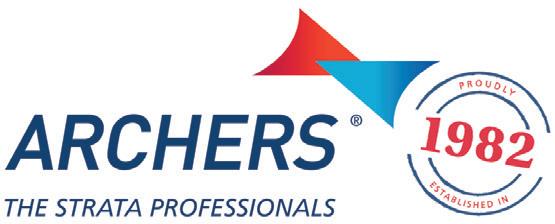




As the saying goes, it’s impossible to keep everyone happy all the time. Hence, the adage “prevention is better than cure” rings true in this context.
The importance of regulatory compliance cannot be overstated. Failure to maintain essential services infrastructure within common property can lead to early equipment failure, voided warranty and insurance claims, regulatory penalties, and breach of contract notices.
Given that a performance audit can precede such consequences, it’s prudent to ensure all aspects of operations are in order sooner rather than later. However, for sole operators or small businesses, formal internal audits often get overlooked. Undertaking these audits not only enhances business performance but also builds confidence as tasks are systematically checked off.
the caretaker. It’s essential for the caretaker to make records available to avoid non-compliance findings in the audit report.
Auditors primarily look for evidence of maintenance of essential services infrastructure. This includes statutory records that prove mandatory maintenance has been conducted, a requirement under the caretaking agreement.
If statutory records are held elsewhere or maintenance approval is pending, these circumstances should be explained to ensure an accurate audit report.
Asset register: Maintain a comprehensive list of all plant, equipment, assets, and infrastructure on common property. Have this ready for the auditor or committee review.



Choosing the right strata manager can make or break your long - term piece of mind and, more importantly, the asset value of your complex
We are a Queensland based strata management company that has significantly increased its market share by providing the highest quality professional service and develop long term values relationships with all stakeholders.
As a service provider under a caretaking agreement with a body corporate, you are responsible for coordinating maintenance on common property as outlined in your agreement. Reviewing your agreement schedule is crucial to understanding these responsibilities.
Regulatory compliance review: This involves ensuring all mandatory servicing of plant, equipment, assets, and infrastructure on common property is coordinated and documented.
Condition of common property: Auditors assess cleanliness, gardening, pool maintenance, minor repairs, and adherence to by-laws.
During a regulatory compliance review, auditors typically conduct a desktop audit of records in collaboration with
Maintenance requirements: Understand the mandatory maintenance requirements for each essential service item. Cross-check against your assets to ensure all plant and equipment is covered.
Maintenance calendar: Schedule maintenance and track service dates to ensure timely upkeep. Follow up with maintenance contractors when records get behind.
Record management: Establish a system for organising digital maintenance records. The records on file provide an audit trail of vigilance in discharging the duty to maintain the common property and keep records.
Preparedness significantly impacts audit performance. Embrace learning opportunities and resources available to enhance regulatory compliance capabilities.

By Sam Steel, Co-Founder, Resly
In today’s digital age, hotels that fail to fully leverage mobile strategies may miss significant revenue opportunities.
With mobile bookings now constituting a major portion of hotel reservations, accounting for over half of all Booking.com room nights, smartphones’ convenience and accessibility have made them a preferred tool for travellers planning and managing their stays. Here are some key areas where hotels can capitalise on mobile users to maximise revenue and enhance guest experiences.
A seamless, intuitive mobile experience is not just important; it’s crucial for converting mobile traffic into bookings. The first step is ensuring your website and booking engine are not just mobile-friendly but optimised for mobile use. This means having a responsive design that adapts to various screen sizes, quick loading times, easy navigation, and a secure booking process. However, having a mobilefriendly website is not enough; the booking engine itself needs to be easily used on a mobile device. There’s no point in having a great website if, when users click to book, the experience is poor, leading to lost sales.

An optimised mobile booking engine should be user-friendly, with minimal steps to complete a reservation, and should work seamlessly across different devices and operating systems.
Social media plays a pivotal role in how travellers discover and interact with hotels. By linking social media to a mobile strategy, hotels can engage users where they spend a significant amount of their online time. This includes creating mobile-optimised content, running social media campaigns that drive traffic to the mobile site, and enabling direct bookings through social media platforms. Engaging content and targeted ads can attract mobile users and convert social interactions into bookings.
While focusing on overall mobile users, having some exclusive mobile-only fenced promotions can be a gamechanger. These are promotions only available to guests using a mobile device, and they can create a sense of urgency
and exclusivity, encouraging users to book directly through their mobile devices. Such promotions can be particularly effective in driving last-minute bookings, filling unsold inventory, optimising occupancy rates, and boosting revenue.
Implementing mobile check-in options streamlines the guest experience, reducing wait times and improving convenience. Guests appreciate the ability to manage their stay from their smartphones, checking in before arrival without the need to visit the front desk. This enhances guest satisfaction and frees up staff to focus on providing more personalised service.
Two-way SMS allows hotels to communicate with their guests in real-time, directly. This can be used to confirm bookings, handle enquiries, or address any issues that may arise during the guest’s stay. The immediacy of SMS means that guests can receive quick responses to their questions, enhancing their overall experience. For
instance, guests can request additional amenities or late check-out via SMS and receive confirmation promptly, improving their perception of the hotel’s customer service.
Hotels that do not fully leverage mobile strategies are not just missing out on opportunities; they are potentially losing money. Embracing a comprehensive mobile strategy can lead to increased direct bookings, higher profit margins, and more personalised guest experiences, ultimately enhancing the hotel’s overall competitiveness in the digital age.
The shift towards mobile-first experiences is not just a trend but a necessity in the hospitality industry. Hotels that adapt and innovate their mobile strategies will capture more bookings and build stronger relationships with their guests, ensuring long-term success and growth. By optimising mobile interactions across all touchpoints, hotels can unlock new revenue streams and deliver exceptional service in the digital era.

By Kelley Rigby, Managing Director, Lett s Group
Heck yes! There isn’t just room for it; it is essential.
Recently, I had a phone interview to be a speaker at an upcoming event in Sydney where they said their main focus for the event was really facts, figures, and solid data, to which I kindly replied, “Are you sure you are interviewing
Here are some ideas:
• Pick up the phone and start talking. I feel like a broken record sometimes, but building relationships isn’t hard. You just need to put yourself out there, be authentic, and start getting to know your community.
• Have a community event like a BBQ or a trivia night.
• Newsletters or video updates are a great way to build your trusted brand.
the right Kelley Rigby?” After explaining what I do, I proposed a session we could run called “Is there still room for the fluffy stuff ?” To which they replied with an enthusiastic yes!
In a day and age where there are great AI programs to make our lives easier, which they do 100 percent, it is essential to still have the “fluffy stuff ”.
BEDS & BEDDING The Mattress Company
BUILDING MAINTENANCE SERVICES Fidato Services
FINANCE Green Finance Group
FURNITURE - OUTDOOR Kudos Universal Pty Ltd
PAINTERS & DECORATORS Higgins Coatings Pty Ltd
SWIMMING POOL SUPPLIES/REPAIRS Noosa Pool & Spa Centre
All Preferred Suppliers have been recommended by other accommodation properties for their service and have qualified for inclusion in the programme. The next time you need to use a new supplier, why not make life easier and use a Preferred Supplier.
To find a Preferred Supplier see the directory in the back of this issue
It seems like every webinar, seminar, or industry update we participate in always comes back to relationships and community. The technology that is built around us is there to help us catapult our business, which is fantastic, but if you don’t have the foundations of relationships, then what is the point? I mean, when you look at it, the word is quite literally in our title: CTS Community Title Scheme. While technology certainly plays a significant role in streamlining operations, enhancing communication, and providing valuable insights, it is the personal touch that distinguishes a successful manager in the industry. Developing rapport, understanding the needs and preferences of the owner, and actively demonstrating care for the community are essential in cultivating positive relationships and achieving long-term success.
If you are sitting there wondering, “Kelley, this all sounds great, but where and when do I start building these relationships”? The answer
is yesterday and by simply starting conversations.
Nervous about picking up the phone? Here is a script to help you get started:
“Hi Tim, it’s Kelley here, your onsite manager at Rigby Residence. How are you? Tim, I am just ringing to let you know (add information about something that has happened within the complex). While I have you, Tim, how are things going with your property? Did you need anything or is there anything we can help with?”
At the end of the conversation, you can even say: “Also, Tim, we are going to ring owners every three months just to check in. Is that okay? Obviously, if you need us before then, this is my personal number.” This will lead to more information and conversations.
While technology serves as a valuable asset in the management rights industry, it is the integration of technology with human relationships that drives success. As we navigate the dynamic industry landscape, it is imperative not to overlook the significance of the “fluffy stuff ” – the personal connections, community engagement, and human interaction that truly make a difference. Therefore, there is undoubtedly still ample space for the fluffy stuff in this tech-driven world, and it is this element that ultimately distinguishes an exceptional manager from a good one.











The Sunshine Coast’s iconic Big Pineapple, Australia’s most famous ‘Big Thing,’ has reopened after extensive renovations. The 16-metre structure now features a new café, children’s playground, viewing platform, and a fully restored train. Owner Peter Kendall and CMC Property led the project with sandblasting, repairs, and marine paint.
Originally launched in 1971 in Woombye, the Big Pineapple was a major tourist attraction, drawing over one million visitors annually, including Prince Charles and Princess Diana in 1983. It now hosts Wildlife HQ Zoo, TreeTop Challenge, COYO coconut foods, and Sunshine & Sons distillery. The venue will also host the Big Pineapple Music Festival in October.
Sunshine Coast Council Mayor Rosanna Natoli and Visit Sunshine Coast CEO Matt Stoeckel praised the relaunch, highlighting its blend of nostalgia and modern attractions. The reopening offers both old and new experiences for visitors.
The Sunshine Coast, with its warm sunny days and even warmer waters, is the perfect
winter escape. Activities include whale watching, hinterland trekking, and festivals like The Curated Plate, which showcases the region’s produce and culinary scene.
Mooloolaba is the hub for whale watching and related activities. Visitors can enjoy sunset drinks and prawns while watching the whale migration during The Curated Plate festival. Operators are offering winter discounts, and more offers can be found on the Visit Sunshine Coast Deals website.
Vivid Sydney 2024 concluded its successful 23-day spectacle of light, music, food, and ideas, with nearly a 100 percent increase in Airbnb searches from the previous year. Iconic landmarks were transformed into vibrant displays, with highlights including Dog Trumpet, the Nest installation, and Julia Gutman’s Lighting of the Sails at the Sydney Opera House.
Vivid Music featured acts like Deerhoof and Jen Cloher, while Vivid Ideas hosted conversations with Amy Poehler and the Sex Work walking tour. Vivid Food offered delights like the Vivid Chef Series and Vivid Fire Kitchen. Airbnb, the festival’s Community Partner, reported hosts earning a median of over $1300.


Anticipation for Vivid Sydney 2025 is already building. For more information, visit Vivid Sydney and join the conversation with @vividsydney #vividsydney.
Brisbane has outpaced Sydney and Melbourne as Australia’s leading ‘bleisure’ destination, driven by strong economic growth and increased business travel, according to Corporate Traveller, a division of Flight Centre Travel Group.
From October 2023 to March 2024, inbound travellers to Brisbane spent an average of 5.2 days in the city, surpassing Sydney’s 4.1 days and Melbourne’s 4.6 days. Brisbane’s booming economy, leading the nation in innovation hubs per capita and manufacturing exports, is a key driver. Economic forecasts predict a 68 percent growth in Brisbane’s economy over the next 20 years.
Queensland’s vital sectors, such as mining, oil, and gas, accounted for 17 percent of business travel bookings, with construction, healthcare, services, and manufacturing following. Overall, business travel bookings increased by seven percent year-on-year.
Tom Walley, Global Managing Director for FCTG’s Corporate Traveller, highlighted the opportunities for Brisbane’s SMEs, especially with the city’s ability to attract visitors for extended stays, driven by the upcoming 2032 Brisbane Games and population growth.
Tourism Research Australia’s latest survey results highlight the Gold Coast’s strong postpandemic recovery. The Gold
Coast generated $7.4 billion in visitor expenditure and welcomed 11.6 million visitors in the year ending March 2024.
The Gold Coast led in holiday visitor growth, with 2.5 million domestic overnight holiday visitors, up 0.5 percent year-onyear. International visitation is recovering, with 651,000 visitors from top markets like New Zealand and South Korea.
The Gold Coast offers a variety of experiences this winter, including Italian Renaissance Alive at HOTA Gallery, whale watching cruises, and BIG CITY LIGHTS illuminating the city’s skyscrapers. Upcoming events include two major sporting events and the Pacific Airshow Gold Coast.
Esteemed Sydney chefs Trisha Greentree, Danielle Alvarez, and winemaker Larry Cherubino will debut at Hamilton Island Race Week from August 17 to August 24.
Highlights include:
Monday, August 19: Beachside food and wine experience with Danielle Alvarez and Larry Cherubino on Catseye Beach.
Tuesday, August 20: Fiesta! at Casamigos Tequila’s ‘House of Friends’ with a Mexican feast.
Thursday, August 22: Trisha Greentree takes over the coca chu kitchen for an Asian-inspired menu.
Friday, August 23: Long Lunch by the Sea at Catseye Beach by Piper-Heidsieck.
Limited-edition accommodation is available at a selection of holiday homes and hotels. For bookings and more information, visit Hamilton Island Race Week or call 1300 725 172.



By Stephen West, Business Development Manager, Interline Travel
Cruise holidays promise the allure of discovering new destinations, and the shore excursions offered during these voyages play a pivotal role in shaping the overall experience. As passengers embark on their journey to explore the ports of call, the age-old question arises: Should shore tours be booked through the cruise ship or entrusted to a private tour company?
Navigating this decision requires careful consideration of various factors to ensure that each shore excursion becomes a highlight rather than a missed opportunity.
Booking shore excursions through the cruise ship is often considered the safer and more convenient option. Cruise lines meticulously curate their tour offerings, collaborating with reputable local operators to provide passengers with a seamless and secure experience. From historical city tours to adventurous expeditions, the variety offered by cruise ship excursions is vast, catering to a diverse range of interests.
One of the primary advantages of opting for cruise line-sponsored tours is the assurance of a timely return to the ship. These tours are synchronised with the ship’s schedule, minimising the risk of missing the departure. Cruise ship tours also provide a layer of security, as the cruise line takes responsibility for the logistics, ensuring that passengers are well taken care of throughout the excursion.
Onboard experts, knowledgeable guides, and exclusive access to certain attractions are additional perks associated with cruisesponsored excursions. While these tours may be slightly more expensive than private alternatives, the peace of mind and curated experiences they offer can make the extra cost worthwhile for many passengers.
For the more adventurous and independent-minded traveller, private tour companies present an appealing alternative. Choosing a private tour allows passengers to customise their experience, exploring destinations in a more personalised and intimate way. Private tours often offer flexibility in terms of the itinerary, pace, and even the size of the group, providing a more tailored experience for passengers with specific interests or preferences.
Cost considerations also come into play when comparing private tours with cruise line excursions. In some cases, private tours may offer more competitive pricing, especially for small groups or those willing to share expenses with fellow passengers. However, it’s crucial to weigh these potential cost savings against the benefits and security provided by cruise ship tours.
For the intrepid traveller seeking a balance between security and independence, exploring ports of call independently is a viable option. With access to information
through travel guides, online resources, and local tourism offices, passengers can design their own itineraries, choosing activities and attractions that align with their interests.
While independent exploration allows for a more immersive experience, it requires thorough research and a keen awareness of the ship’s departure time. It’s essential to plan well in advance, ensuring a smooth return to the ship without the safety net provided by organised tours. If you do miss the ship, the onus is on you to catch up at a subsequent port — this can be an expensive problem.
If you opt for an inclusive cruise where shore excursions are included in the fare, most of this decision-making is not an issue.
Regent Seven Seas Cruises offers unlimited shore tours in ports — when travelling to Europe or Alaska, this can save you a fortune. Other lines may include a single tour per port, which may fill that entire day.
As management rights operators, you can purchase these luxury cruises thousands of dollars cheaper than the public, and their tours are just part of the inclusion.
We had a great day at Maroochy River Golf Club on Friday, June 7. The weather was amazing, and the course was in great condition.
The competition for the day was a Texas Scramble.
The results of Round Two of the Accommodation Industry Golf Series were:
1st Placed Team: Lannock Strata Finance – Jason Triplett, Wade Tutai, Nigel, and Tony Blenkinsop.
2nd Placed Team: Mike O’Farrell, Sue O’Farrell, John Mahoney, and Lindsay Durrington.
3rd Placed Team: SSKB –Brendan Edwards, Charli Melief, Greg Sheppard, and Chris Edwards.
Don’t miss the next Accommodation Industry Golf Day at the Glades Golf Club on Thursday, July 25
Details for the day are as follows:
Round Three of the 2024 Accommodation Industry Golf Series will be held at

the Glades Golf Club on Thursday, July 25, with a shotgun start at 12:00 noon.
On the day, we will play a Single Stableford Competition combined with the Club Championship for the best score in A, B, and C Grades. There will also be the usual pin competitions out on the course and the longest drive.
The deal includes golf fees, a cart, a free drink and sandwich on the course, sponsored golf holes, giveaways, stacks of prizes, a burger meal after golf, and more.
Thank you to our amazing sponsors for their continued support of our golf days. Without it we would not be able to provide the golf days for the amazingly low price of $120.
Major sponsors: Watt Utilities, Mahoneys, KONE, Platinum Electrical & Air, McAdam Siemon Business Advisors, Rochele Painting, Nator Constructions, RBC Group, ResortBrokers, and SSKB.
Supporting sponsors: The House of Golf, ARAMA, REI Cloud, Resort News & Letts Group.
For full details and to register, contact Tracey Taylor at taylor77@bigpond.net.au.








In July 2021, Russ and Belinda Leary received devastating news that no parent ever wants to hear. Their daughter, Alexa, had been involved in a severe cycling accident in Pomona and was lying in a Brisbane hospital bed. Doctors told them to prepare for the worst.
However, Alexa, with the unwavering love and support of her parents and family, demonstrated extraordinary resilience. Despite permanent brain damage and weakness on the right side of her body, Alexa, now 22, has become an Australian swimming sensation.
Alexa’s determination and hard work paid off when she won a gold medal and a silver medal at the 2023 World Para Swimming Championships. Her remarkable achievements have now led to her selection to compete at the 2024 Summer Paralympics in Paris.
The Leary family is well-known in the management rights industry. Russ has been in the

industry for over three decades, and two of Alexa’s sisters, Madison and Ashtyn, currently own two management rights buildings on the Gold Coast. The entire family, including all
six siblings, plan to travel to Paris in August to cheer for, and support incredible Alexa.
This inspiring journey from a hospital bed to the global stage of the Paralympics
In May, Glenn Millar entered his 20th year with national accommodation property specialist ResortBrokers.
Glenn is a management rights institution, well known and well respected on the Sunshine Coast, where he has more than capably represented ResortBrokers for the last two decades, particularly in the premium, high-netting end of the management rights market.
With ResortBrokers, he has sold more than 160 management rights businesses with a combined value exceeding $430
million, equating to a sale settling every 25 days on average. Not many brokers come close to this volume and scale.
Since 2020, Glenn has teamed up with Chenoa Daniel to form ResortBrokers’ hugely successful Sunshine Coast duo, landing some significant deals including the September 2023 sale of the management rights to Oceans Mooloolaba Beach, which set a new Sunshine Coast record of over $11 million. Never one to rest on his laurels, Glenn took home ResortBrokers’ Top Management Rights Broker award in FY23, an award he’s won several times previously.








highlights Alexa’s strength and the immense support from her family.
We will also be following amazing Alexa’s Paris journey. Go Lex!

































Join Us for the Next “Women In” Luncheon! Get ready for a fun-filled afternoon of networking in our industry next month. These luncheons are a fantastic opportunity to share information, solutions, and contacts in a supportive and engaging environment.

Exciting news! We’ve recently opened this platform to include men in our industry while still offering exclusive women-only events. Don’t miss out – connect, learn, and grow with us!
Surfers Pavilion – Gold Coast, Wednesday, August 21. Hosted by Property Bridge Brisbane, Friday, August 9. Venue: TBC. Hosted by Accom Valuers.
To secure your tickets and find out more, head to www.womenin.com.au or email marisa@womenin.com.au or call 0452 113 167.




Last chance to get your ticket for the ARAMA Top Awards 2024 on July 23, at Sea World Resort, Gold Coast.
Tickets now ready to purchase for the Resly & Women In Best of Tourism Awards 2024
Where? Star Casino Gold Coast
When? October 8, 2024.
It’s time to start planning your outfit—the theme of this year’s Best of Tourism Awards annual gala is Secret Garden!

A new study revealed that the proposed Sheraton hotel in Hervey Bay will significantly benefit the Fraser Coast economy and job market.
Developer, Sunny Beach Land, commissioned Urban Economics to update its report, after signing a Memorandum of Understanding with Marriott International to manage the resort. The study, part of the Development Application lodged with the Fraser Coast Regional Council, shows a projected economic benefit of $583 million, up from $425 million. Local industries will see a direct injection of $343 million, an increase from $250 million. Employment opportunities are set to rise from 1350 to 1700 jobs.
Sunny Beach Land Director Dan Cuda highlighted the local community benefits and dismissed misinformation campaigns. He noted potential growth for local businesses, increased direct flights to Hervey Bay, and tourism sustainability.
The proposed Sheraton Hervey Bay will feature 223 rooms, up from the initially planned 187, and include a snorkelling and dive pool. The project is expected to generate an additional $12 million in annual visitor spending and attract 103,000 overnight visitors per year. Approximately 50 local apprentices will be employed, aiding skill development and job creation.
Urban Economics emphasised the need for a critical mass of hotel rooms to attract a highcalibre operator like Sheraton. The mixed-use development will also provide various housing options near local amenities and retail.
Melbourne Place, a new 14-storey, 191-room luxury hotel, will open in the CBD at 130 Russell Street this October.
The hotel will feature state-of-theart accommodation, award-winning design, and world-class dining, including a rooftop restaurant headed by Nicholas Deligiannis.
Executive General Manager
Tracy Atherton aims to create a design-forward culinary hub that encapsulates Melbourne’s essence. The hotel will also offer meeting and event spaces, boutique retail, and unparalleled guest experiences.











































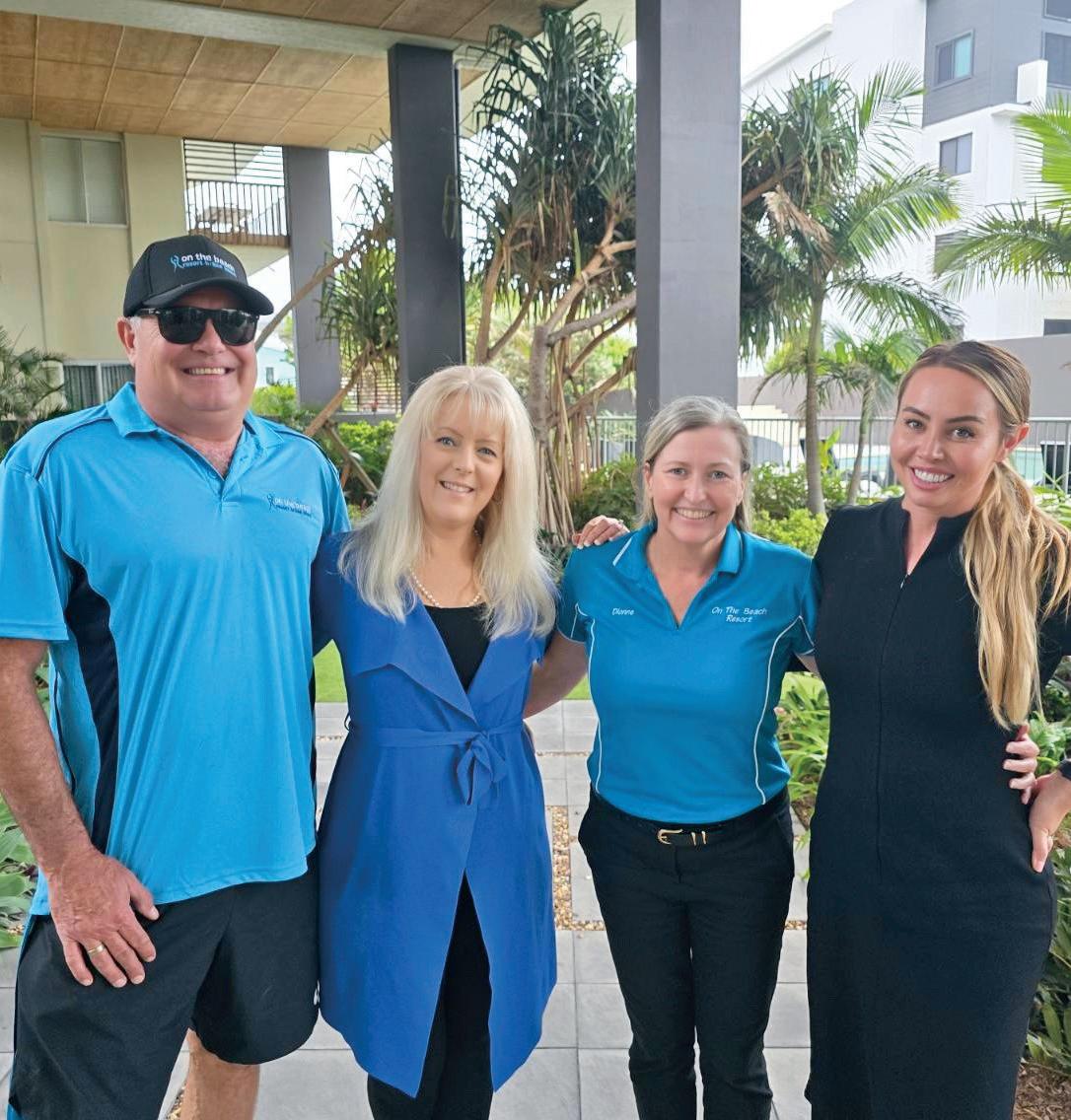
A sea change for buyers Alison and Peter Gaiero who recently purchased the management rights to 37-apartment mid-rise On The Beach at Woorim on Bribie Island through ResortBrokers’ Sunshine Coast team of Glenn Miller and Chenoa Daniel (pictured right). The Gaieros had previously operated the Golden Harvest Motor in Moree.































Kings Beach QLD

























Trusted since 2002, our team is committed to quality of service across the Accommodation and Management Rights business sector, taking a 360 degree approach to the challenges and opportunity in these markets.
Your expert for your area

























Contact: Phil Trimble, 0418 478 966 phil@mrsales.com.au
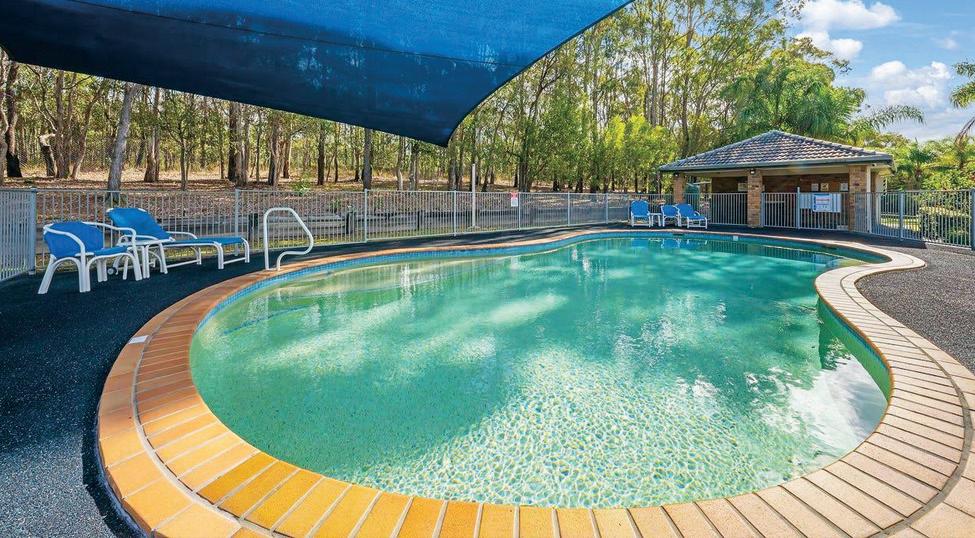
Contact: Paul Mueller, 0439 255 507 paul@raas.com.au
Contact: Tim Crooks, 0417 544 562

Contact: Craig Johnson, 0493 108 073 craig@hotelresortsales.com.au






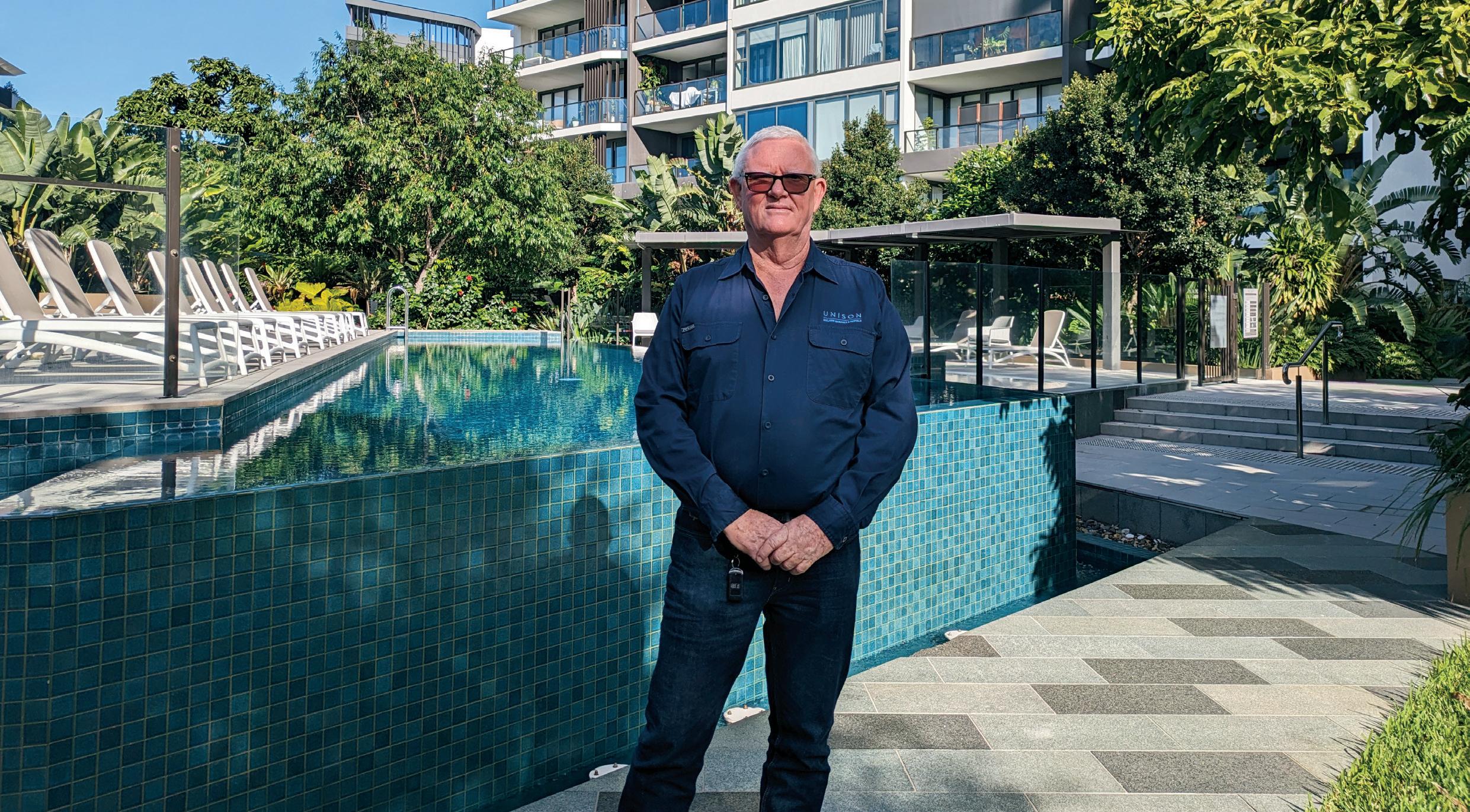
By Mandy Clarke, Editor
From wool buyer in New South Wales to management rights owner-operator of Unison Apartments, one of Brisbane’s premier residential buildings overlooking the rooftops of Teneriffe’s heritage woolstores, Keith Braithwaite’s career journey is as dynamic as it is impressive.
Jokingly known as the “Godfather of Management Rights” by his colleagues, Keith has been a stalwart in the industry for over two decades, managing properties with a blend of technical proficiency and genuine

Onsite management is demanding and keeping fresh is important
commitment to stakeholder and resident satisfaction.
Keith began his career as a country-based wool buyer in Griffith, NSW. However, when the wool industry hit a bump in the 1990s it prompted him and his wife Heather, a midwife, to rethink their future. The couple loved holidaying in Queensland, and had regarded management rights as a “promising preretirement move”. But when they were only in their 30s, they
sold up and moved to Brisbane with their young family. Keith and Heather purchased the management rights to a mixed residential building with 60 apartments in Spring Hill.
Over the years, Keith and Heather have managed seven buildings. They have enjoyed stints in both Townsville and Newcastle, but Brisbane always drew them back. Keith also gained invaluable real estate experience working for leaders in the management rights
In 2016, Keith and Heather acquired the management rights to Unison Apartments. They went on to own and manage two more Brisbane buildings but have since sold them, making Unison their priority. Keith has always sought the assistance of trusted MLR industry professionals for deals and transactions.
Regarding his longstanding relationship with Mike Phipps and the team at Mike Phipps Finance, he said: “I have worked with Mike for about 15 years. He was my go-to finance broker when I was selling motels and management rights and has been involved in our deals since then. If there is a way to make a deal work, Mike and his team will find it.”


Trent Pevy has been Keith’s preferred lawyer for the past decade. Keith said: “He is commercial in his thinking and attitude. His wise counsel has helped us achieve several top-ups and navigate through a couple of out-of-the-ordinary negotiations. He is always available and never puts roadblocks in the way of a deal.”
Keith has a close relationship with both Alex Cook and Ian Crooks from ResortBrokers, Alex assisted Keith and Heather with their past two sales. “Alex is a champion at keeping a deal together, these days getting a transaction to settlement is a lot more difficult than getting the deal in the first place,” Keith said.




Unison Apartments is a highquality Mirvac residential development located in Newstead. The popular innercity locale is close to Gasworks Plaza, the area’s favourite food and retail precinct. Initially, Keith and Heather lived onsite for four years before moving off-site to be closer to their daughter and grandchildren. Heather has now retired.
Unison, with stunning views across the Brisbane River, the city,
and historic Teneriffe, stands as a testament to Keith’s dedication to the MLR sector. The building boasts 290 residences with modern, refined interiors. The extensive amenities include an 18m lap pool, an integrated plunge pool, two outdoor kitchens, and a yoga lawn. The design focus of the entire property fosters a cohesive residential community.
“ Managing Unison is a team effort,” Keith said. “I work alongside our operations

Specialising in management rights and other accommodation business syndicates

manager, Hayden Freier. He brings a background in property management, and I have spent time passing on some of my management rights skills and experience to him. He now lives onsite and is doing a fantastic job. The team also includes part-time property manager Amy Wilkosz, leasing and administration Wizkid Sam Waterson, and our hard-working full-time maintenance guru Ray Krikhoff.
“When we employ staff, we try to
find the smartest people we can and train them to think like we do. I cannot recall the last time I did not agree with a decision they’ve made. We have an informal staff meeting every Tuesday lunchtime, and we have the perfect way to choose the venue—an electronic chocolate wheel. I love working with these bright young people!” Together, the team ensures the 115 units in the letting pool are well-maintained and the entire property remains pristine.


Trent and the Pevy Lawyers team are proud to serve as trusted legal advisors to Keith and Heather on all their management rights matters including Unison at Waterfront
Work with the firm that delivers nationwide, industry leading transactional services and advice across all accommodation based business types. Helping hundreds of resident managers and operators each year to acquire, sell, protect and grow their business.








At Fidato Services, we specialise in high-access property services. Our rope access technicians are highly trained and experienced in handling tasks that require working at heights, such as façade maintenance and building inspections. By choosing Fidato Services, clients benefit from cost-e ective solutions, improved safety, and reduced disruption to the building’s occupants. Our expertise in rope access ensures that even the most challenging tasks are executed with precision.
• Painting & Remedial
• Facade Maintenance
• Height Access Solutions
• Facade Installs
Additional services include:
• Anchor certifications
• Dilapidation Reports
• Waterproofing
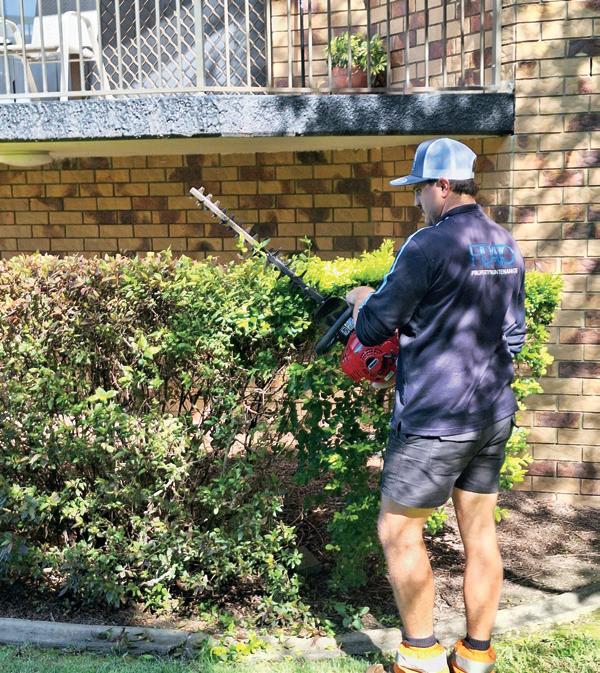


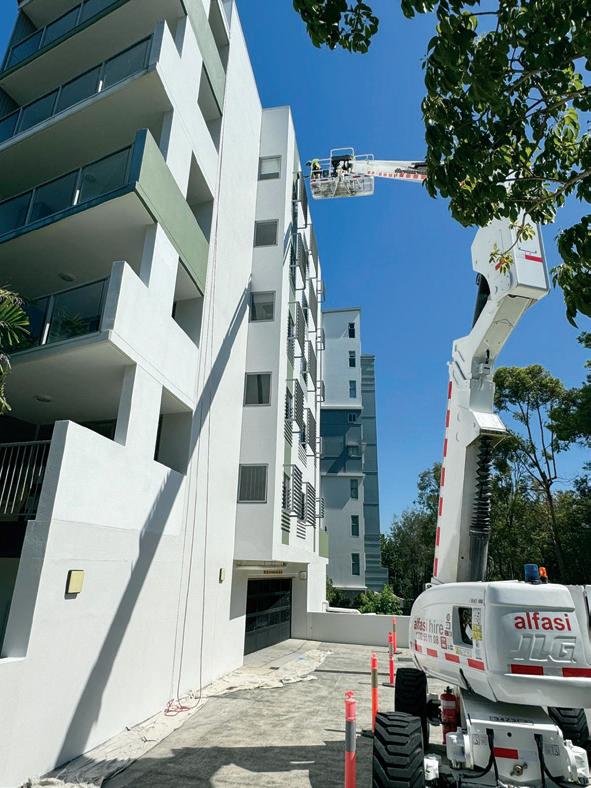


Comprehensive property maintenance is at the heart of our services. From lawn and gardening care, hedging and trimming, to pool maintenance, pressure cleaning, and soft landscaping, we ensure every aspect of your property is expertly managed. Whether it’s taming unruly green spaces, preserving the pristine condition of your pool, or revitalizing outdoor areas, our dedicated team takes pride in delivering top-notch services.
• Complete Garden Maintenance
• Pool Maintenance
• Commercial Cleaning
• Hedging & Trimming
Additional services include:
• Pressure Cleaning
• Tree Lopping
• Irrigation & Sprinkler System Repair
• Mulching

We are your dedicated partners in comprehensive painting and maintenance solutions. Whether you’re seeking to revitalize commercial spaces of any size, need protective coatings to safeguard your investments, or are looking for tailored painting services for educational, body corporate, industrial, or domestic needs, we’ve got you covered. From roof and floor repaints to minor rectification works and preventative maintenance, we bring expertise and precision to every project.
• Protective Coatings
• Roof & Floor Repaints
• Preventative Maintenance
• Apartment Complex Re-paints
• Body Corporate Projects











Keith’s top maintenance tip of “keep the outer areas clean” is simple yet effective. “Maintaining a clean car park makes it easier to keep the inside of the building pristine because grime and dust are not constantly walked in,” he explained.
Another vital maintenance job is a regular high-rise external building wash, which is essential for assessing paintwork and managing repairs. It is also important to ensure windows and glass balconies are kept sparkling clean.
“We do a full wash on our buildings once a year, including all external inaccessible glass close to Christmas time, and we wash the glass again in July,” Keith said.
“Matt and his team from Fidato Services have been doing our rope access work for the past five years. We knew Matt when he was the team leader with another company and have supported him since he established Fidato. The window wash should be completed by mid-July this year. Matt is also qualified to paint high-rise buildings and is great at external maintenance such as finding and repairing water ingress.”
This meticulous attention to detail is part of what makes Unison such a desirable place to live and Keith such a respected manager.
His success over the years can be attributed to not only having such a proactive approach to maintenance but also his strong communication skills. He stresses the importance of working closely with the body corporate and maintaining good relationships with residents and stakeholders. He suggests that regular newsletters promote effective communication, and working with a proactive committee helps ensure that the property is well-maintained, and any issues are promptly addressed.
As a long-time member of the Australian Resident Accommodation Managers
Association (ARAMA), Keith passionately believes in a bright future for the management rights industry. “It’s such a secure investment with a guaranteed income, and that has always carried us through difficult economic times and even COVID-19 lockdowns,” he said.
What is the secret to Keith’s longevity and success in this industry? Thoughtful, he pares his answer down, simply saying: “It’s about working hard and making sure you remember who you work for—the body corporate! And ALWAYS go above and beyond expectations. Your duties are clearly documented in your agreements, if you cannot do all
the duties yourself for whatever reason, pay someone to do them.”
His other hint is to take regular breaks, because “onsite management is demanding and keeping fresh is important”.
Keith’s journey from wool buyer to renowned building manager and one of the most respected management rights industry ‘originals’ is a story of dedication, adaptability, and a relentless pursuit of excellence. His work at Unison Apartments has not only enhanced the residents’ and stakeholders’ experience but also helped create harmonious community living. He sets a high standard for the MLR industry.
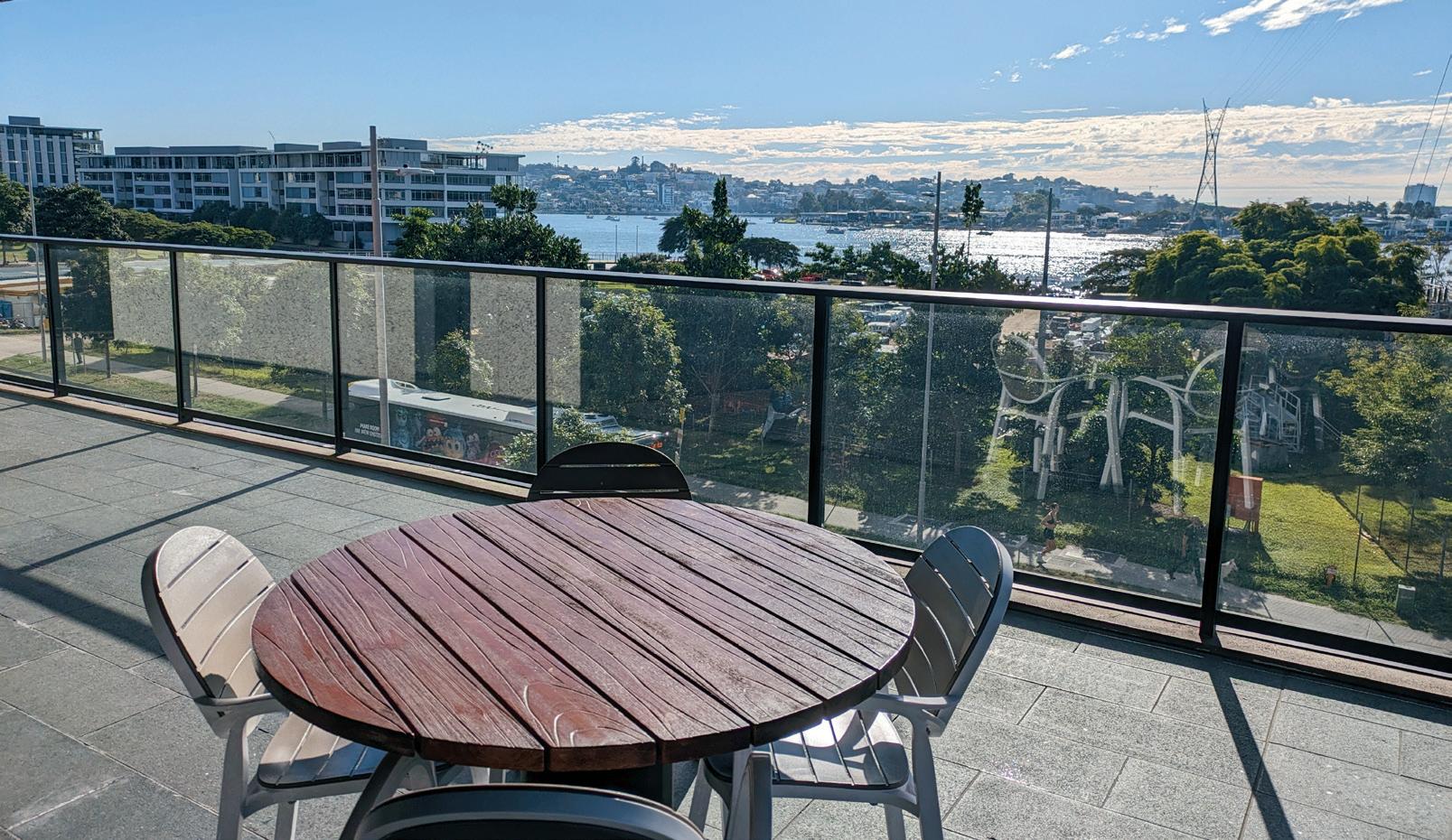





Our intuitive software uses advanced technology for simplified trust accounting. Backed by our dedicated support team.
The ultimate solution for streamlined management rights and holiday letting.









































































































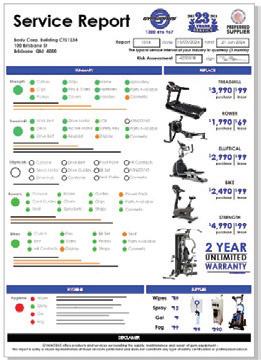









































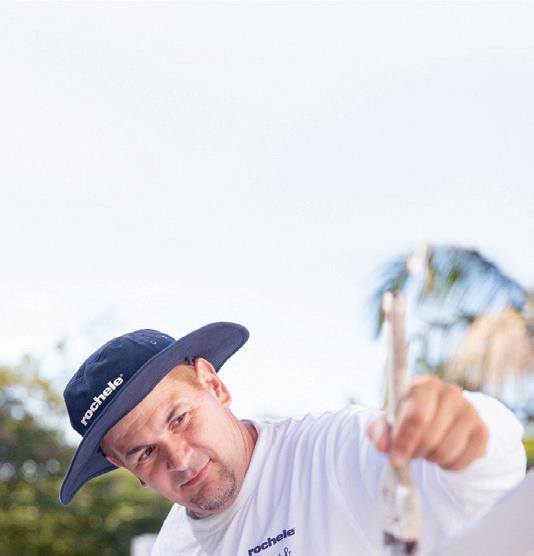







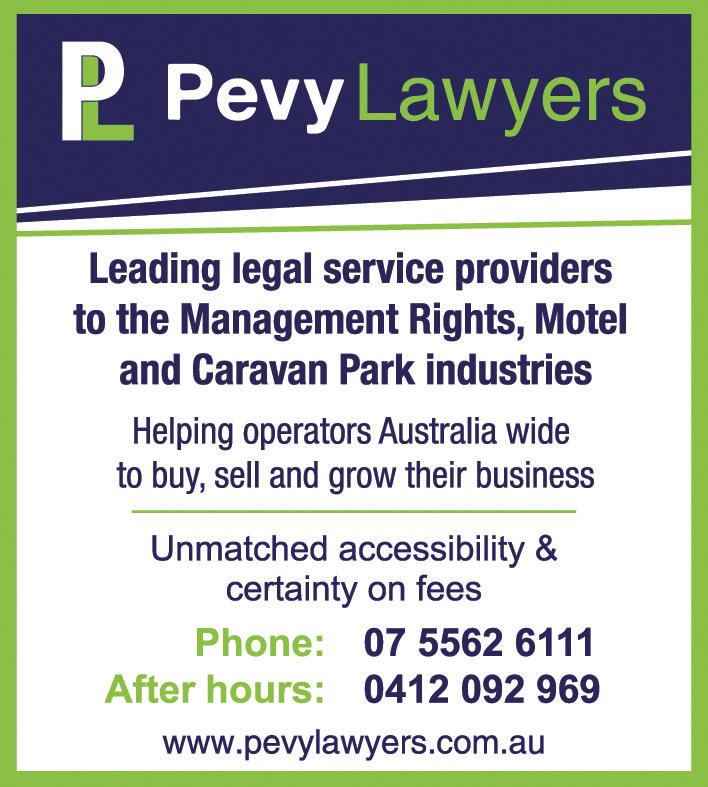










































At Fidato Services, we specialise in high-access property services. Our rope access technicians are highly trained and experienced in handling tasks that require working at heights, such as façade maintenance and building inspections. By choosing Fidato Services, clients benefit from cost-e ective solutions, improved safety, and reduced disruption to the building’s occupants. Our expertise in rope access ensures that even the most challenging tasks are executed with precision.
• Painting & Remedial
• Facade Maintenance
• Height Access Solutions
• Facade Installs
Additional services include:
• Anchor certifications
• Dilapidation Reports
• Waterproofing






Comprehensive property maintenance is at the heart of our services. From lawn and gardening care, hedging and trimming, to pool maintenance, pressure cleaning, and soft landscaping, we ensure every aspect of your property is expertly managed. Whether it’s taming unruly green spaces, preserving the pristine condition of your pool, or revitalizing outdoor areas, our dedicated team takes pride in delivering top-notch services.
• Complete Garden Maintenance
• Pool Maintenance
• Commercial Cleaning
• Hedging & Trimming
Additional services include:
• Pressure Cleaning
• Tree Lopping
• Irrigation & Sprinkler System Repair
• Mulching

We are your dedicated partners in comprehensive painting and maintenance solutions. Whether you’re seeking to revitalize commercial spaces of any size, need protective coatings to safeguard your investments, or are looking for tailored painting services for educational, body corporate, industrial, or domestic needs, we’ve got you covered. From roof and floor repaints to minor rectification works and preventative maintenance, we bring expertise and precision to every project.
• Protective Coatings
• Roof & Floor Repaints
• Preventative Maintenance
• Apartment Complex Re-paints
• Body Corporate Projects









